When deciding on the best road bike for your needs, it’s easy to feel overwhelmed by the choices available. There are many types of road bikes and countless options in any given price range.
This article will help you select the best road bike for you, covering the best road bikes as ridden and reviewed by our team of expert testers.
Our team have reviewed a huge number of road bikes over the years. They regularly test budget options suitable for commuting, pro-level superbikes costing over £10,000, and road bikes that ride a lot like gravel bikes.
Regardless of price, all road bikes are designed to take you far and fast on paved surfaces, earning their name from the terrain they're meant to be used on. While the latest road bikes have a similar appearance to those of 50 years ago, with double-triangle frames and drop handlebars, these bikes have come on in leaps and bounds.
At the top and middle of the market, they now feature disc brakes, carbon fibre frames and electronic gears. The lower end of the market still sees road bikes with metal frames and rim brakes. But these bikes have also evolved, with increased tyre clearance and modern, comfortable geometry.
We have split this list into the different categories of road bikes, as well as entry-level and price-point options, so there should be something here for everyone.
Navigation:
- Best endurance road bikes
- Best road race bikes
- Best aero road bikes
- Best women’s road bikes
- Best budget road bikes
- Road bikes by price
You can also jump to our in-depth road bike buyer’s guide, which explains everything you need to know about road bikes and will help you find the right road bike for you. Otherwise, keep reading for our pick of the best road bikes in 2025.
Editor's note: we updated our best road bikes list on 23 April 2025 with our latest high-scoring reviews, including the Van Rysel RCR Pro Team Edition.
Best road bikes 2025
Best endurance road bikes
The best endurance road bikes help you cover long distances in comfort, with a relaxed riding position, an emphasis on compliance and greater versatility than race bikes.
Giant Defy Advanced Pro 2
SQUIRREL_TEXT_13151969

- £3,499 / €3,900 as tested
- Pros: Nearly top-level performance at lower cost; poised handling; excellent comfort
- Cons: Sluggish tyres
The Giant Defy Advanced Pro 2 fulfils all the requirements of an endurance road bike, such as comfort and versatility, without compromising on thrills.
With identical geometry to the premium SL model, its handling is relatively fast, but also stable.
The mudguard-compatible frame is amply compliant for a road-centric endurance bike that doesn't flirt with the all-road category.
Built around the excellent Shimano 105 Di2 groupset and finished with quality in-house parts, the Giant Defy Advanced Pro 2's spec rivals more expensive bikes.
- Read more: Giant Defy Advanced Pro 2 review
SQUIRREL_13151969
Merida Scultura Endurance 4000
SQUIRREL_TEXT_13083746

- £2,250 / €2,499 / AU$3,199 as tested
- Pros: Great value; comfortable; mudguard-ready
- Cons: Tyres aren’t the most supple
Merida’s Scultura Endurance 4000 is a top-performing long-distance road bike, with a great spec and an attractive price.
The heart of the bike is a smart carbon fibre frameset, complete with a carbon seatpost and a 12-speed Shimano 105 7100 groupset that provides excellent shifting and braking performance.
The relatively tall head tube means the ride position is more relaxed than on the racier Scultura Team (our 2022 Performance Bike of The Year), but you can still find a fast position when you want to, while the racy head tube angle keeps the handling lively.
Perhaps with long-distance durability in mind, the stock, 700x32c Maxxis Re-Fuse tyres focus on toughness over speed, meaning they aren’t the most supple available.
That aside, the Scultura Endurance 4000 is a great option for year-round road-based adventures at a fantastic price.
- Read more: Merida Scultura 4000 review
SQUIRREL_13083746
BMC Roadmachine 01 Two
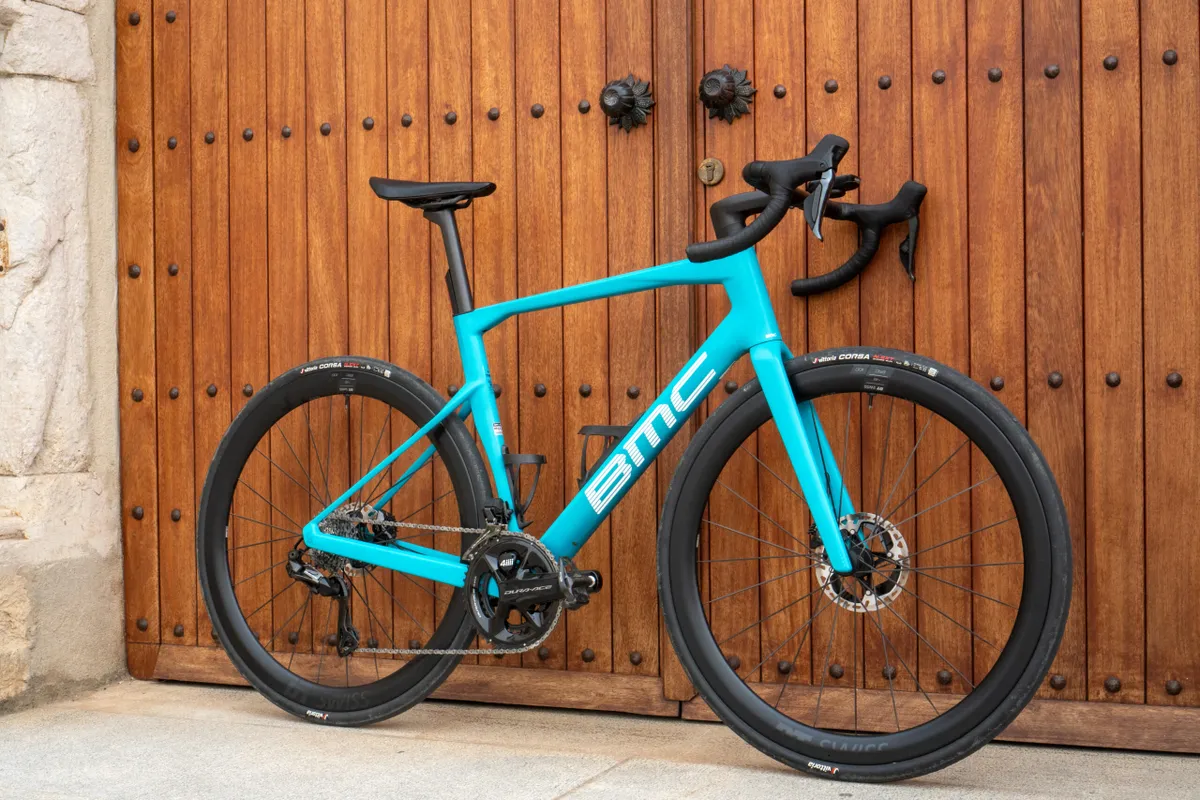
- $12,999 / €12,999 / AU$17,499 as tested
- Pros: Wonderful ride feel; 40mm tyre clearance; spot-on geometry; down tube storage
- Cons: Mighty price; not that light
The BMC Roadmachine 01 Two is hard to beat if your endurance bike budget is nearly unlimited.
Sumptuous ride quality, which the 40mm tyre clearance could enhance, combines with nimble yet reassuring handling.
The lavish build features a Shimano Dura-Ace Di2 groupset, DT Swiss ERC 1100 Dicut 45mm-deep wheels, a carbon one-piece cockpit and a dual-sided power meter.
But considering the five-figure price tag, the Roadmachine 01 Two's 7.4kg actual weight in size 56cm may underwhelm.
- Read more: BMC Roadmachine 01 Two review
Canyon Endurace CFR AXS
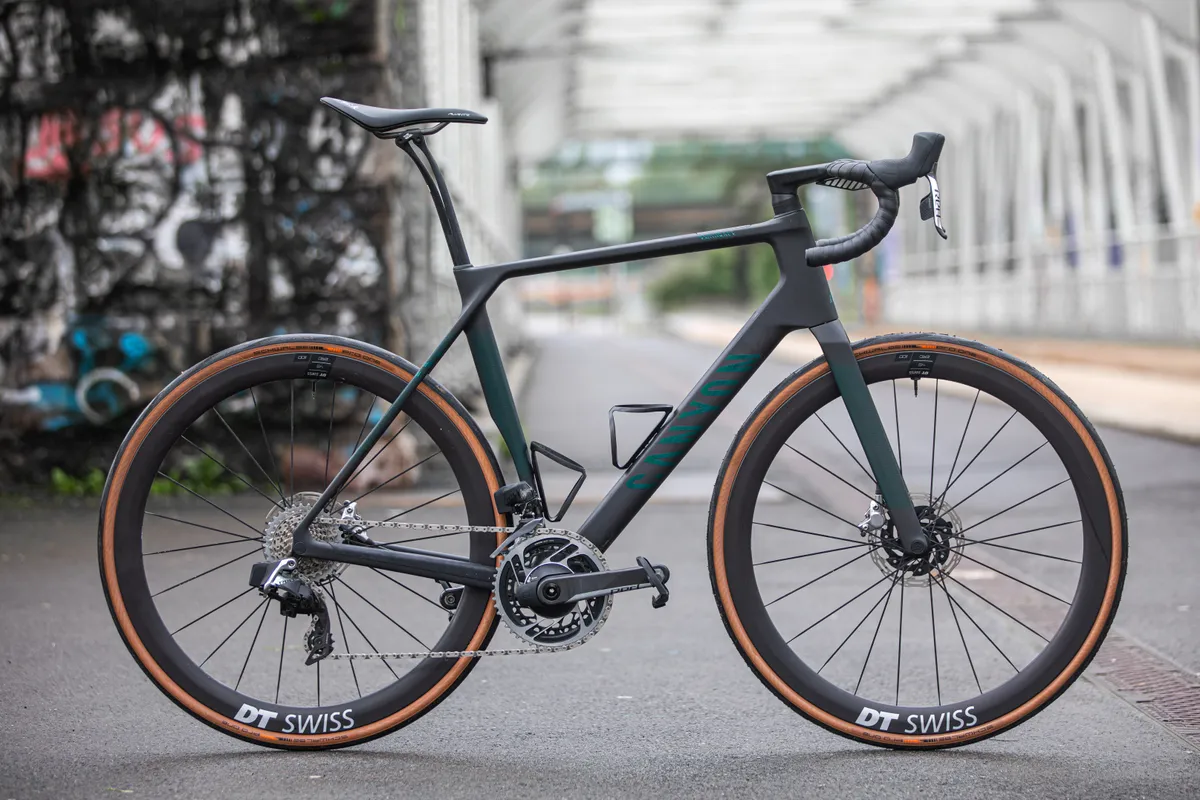
- £8,999 / $8,999 / €9,499 / AU$14,349 as tested
- Pros: Very quick; adjustable integration; low weight
- Cons: Bar taping; no mudguard mounts
The Canyon Endurace CFR AXS is best thought of as a long-distance superbike.
Bringing together the best of the endurance and race worlds, it’s lightning-quick with ride-damping 32mm tyres, a suspension seatpost and a more upright ride position.
The bike has versatile 45mm-deep carbon wheels and ample gear range for longer climbs and big days in the saddle.
Canyon has built some nifty features into the latest generation of the Endurace, with built-in top-tube storage and an adjustable handlebar.
- Read more: Canyon Endurace CFR AXS review
Specialized Roubaix SL8 Sport 105
SQUIRREL_TEXT_13079792

- £3,000 / $3,500 / €3,800 / AU$5,400 as tested
- Pros: Fast; comfortable; competent on varied surfaces
- Cons: Average wheels
Specialized’s Roubaix is a true classic of the endurance bike category, and the latest SL8 model doesn’t disappoint.
With clearance for up to 40mm-wide tyres, the Specialized Roubaix SL8 Sport 105 is equally at home on the road as it is on light gravel and everything in-between.
Up front, Specialized’s Future Shock suspends the handlebars above the upper headset bearing, providing 20mm of comfort-boosting travel. The version here isn’t adjustable, as it is on the S-Works bike, though.
As the name suggests, the groupset is Shimano’s 12-speed 105 R7100, which performs brilliantly.
A basic alloy wheelset completes the build, although our tester was pleased to see Specialized didn’t skimp on the tyres – speccing high-quality S-Works Mondo 2BR tubeless-ready tyres in a size 700x32c.
- Read more: Specialized Roubaix SL8 Sport 105 review
SQUIRREL_13079792
Best road race bikes
The best road race bikes are designed to be as efficient and fast as possible, often marrying carbon fibre components with aerodynamic designs.
They tend to put you in a more aggressive position than endurance bikes, but are still more versatile than aero road bikes.
BMC Teammachine R 01 LTD
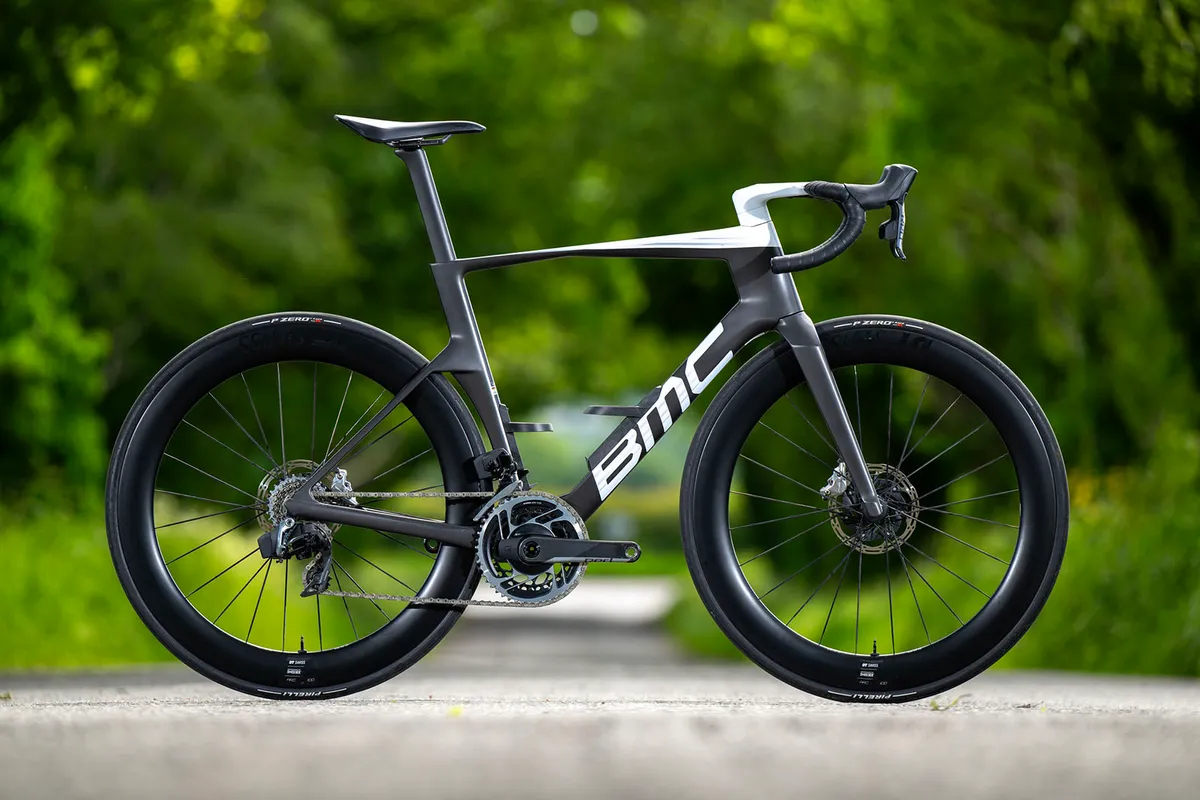
- £14,999 / $14,999 / €14,499 as tested
- Pros: Feels incredibly efficient; near-perfect spec; narrow cockpit
- Cons: Relatively fragile tyres
Developed in partnership with Red Bull Advanced Technologies (an offshoot of the Formula One team), the BMC Teammachine R is part aero bike, part all-rounder.
As you might expect, the angular carbon frameset puts a premium on aerodynamic optimisations, without adding undue weight.
Up-front, the integrated handlebar also plays into this theme, with just a single, super-narrow 36cm bar width available. You do get a choice of stem length, though, and the Teammachine R can be run with a non-integrated setup if desired.
The flagship spec is also hard to fault (which you’d expect at this price), although this particular model has now been superseded by one sporting the latest SRAM Red AXS groupset.
- Read more: BMC Teammachine R 01 LTD review
Cannondale SuperSix Evo Lab71 EF Replica
SQUIRREL_TEXT_13151949

- £12,500 / $14,000 / €14,499 as tested
- Pros: Outstanding handling; stiff yet comfortable; near-flawless spec
- Cons: Fit customisations cost extra
Cannondale’s flagship SuperSix Evo Lab71 is an archetypal road racing bike, with the aggressive ride position and reactive handling to match.
Here, in its lightest (and most expensive) guise, this WorldTour replica SuperSix Evo also gets the striking EF Education–EasyPost paintjob to help it stand out from the crowd.
Our tester praised its first-rate handling and racing-focused build, consisting of a Shimano Dura-Ace Di2 R9200 groupset, Vision Metron 60 SL carbon wheels and an FSA PowerBox power meter crankset. In terms of pure performance, there’s little to fault here.
The only downside is that, despite the five-figure outlay, specification changes for fit reasons (such as a handlebar or seatpost swap), aren’t generally offered free of charge by Cannondale dealers. If you need these, you'll likely have to cough up more cash for the privilege.
SQUIRREL_13151949
ENVE Melee (Ultegra Di2)
SQUIRREL_TEXT_13151946
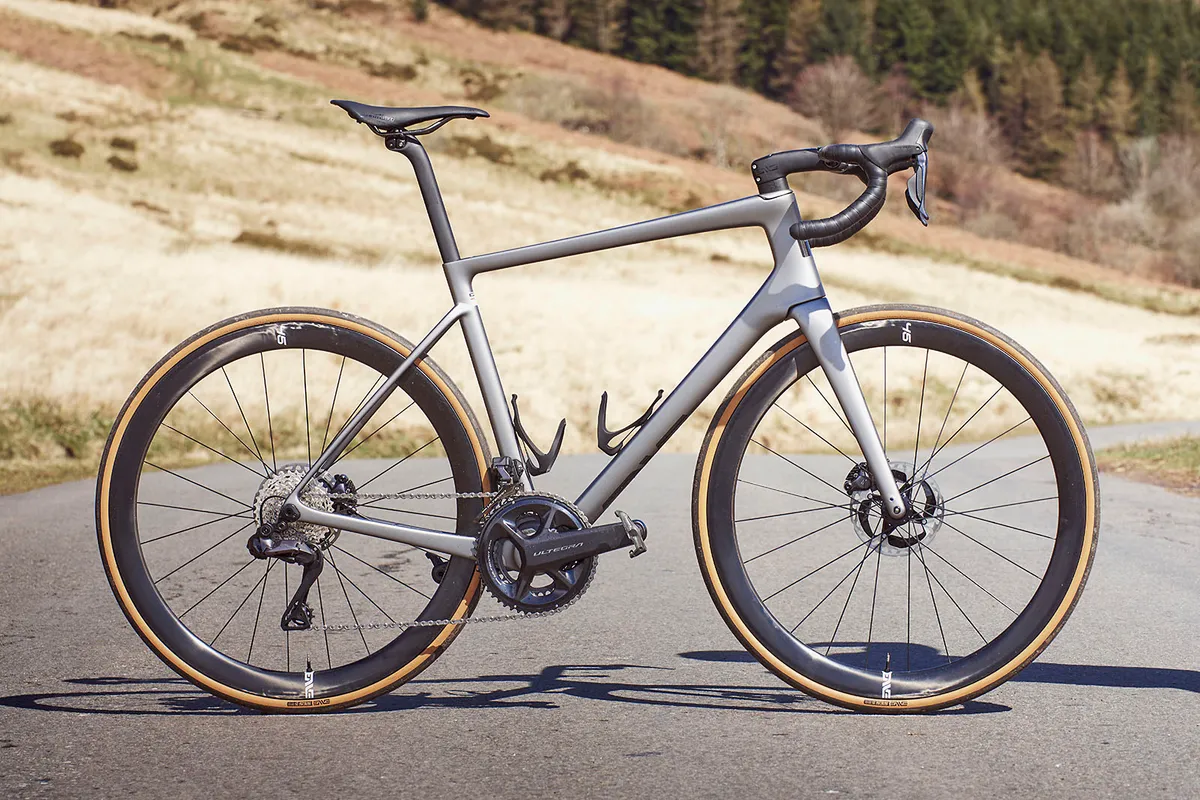
- £10,400 / $12,834 / AU$19,220 as tested
- Pros: Geometry; handling; speed; customisable
- Cons: No full build off-the-peg; price
The ENVE Melee in its Ultegra Di2 guise was our 2023 Performance Road Bike of the Year.
It’s a standard-setter when it comes to race bikes with greater versatility, with its balanced geometry, comfort and easy handling.
ENVE sells the Melee as a chassis, which means there are no off-the-peg builds, but you can customise it to your heart’s content.
Our tester concluded it's the one race bike regular road bike riders should buy – if they can afford it.
- Read more: ENVE Melee review
SQUIRREL_13151946
Focus Izalco Max 9.8
SQUIRREL_TEXT_13151948

- £6,599 / €6,799 / AU$10,499 as tested
- Pros: Fast, light and practical; lovely handling; good value
- Cons: No power meter
The Izalco Max is the latest version of Focus' do-it-all race bike, and combines aerodynamics, low weight and assured handling.
Focus hasn't sacrificed practicality and adjustability for integration at the front end. Brake and gear cables are routed underneath the C.I.S 2.0 stem and into the upper headset bearing. The stem's standard 31.8mm clamping diameter means you can easily replace the stock Easton EC70 Aero Handlebar if desired.
The spec, including DT Swiss ERC DICUT 45 wheels and a Shimano Ultegra Di2 R8100 groupset, of the second-tier Izalco Max 9.8 is competitive for the money. A power meter is the only notable omission.
Although the Izalco Max lacks pizzaz, other similarly versatile race bikes don't have this in spades either.
- Read more: Focus Izalco Max 9.8 review
SQUIRREL_13151948
Giant TCR Advanced SL 0 Dura-Ace Di2
SQUIRREL_TEXT_13117603
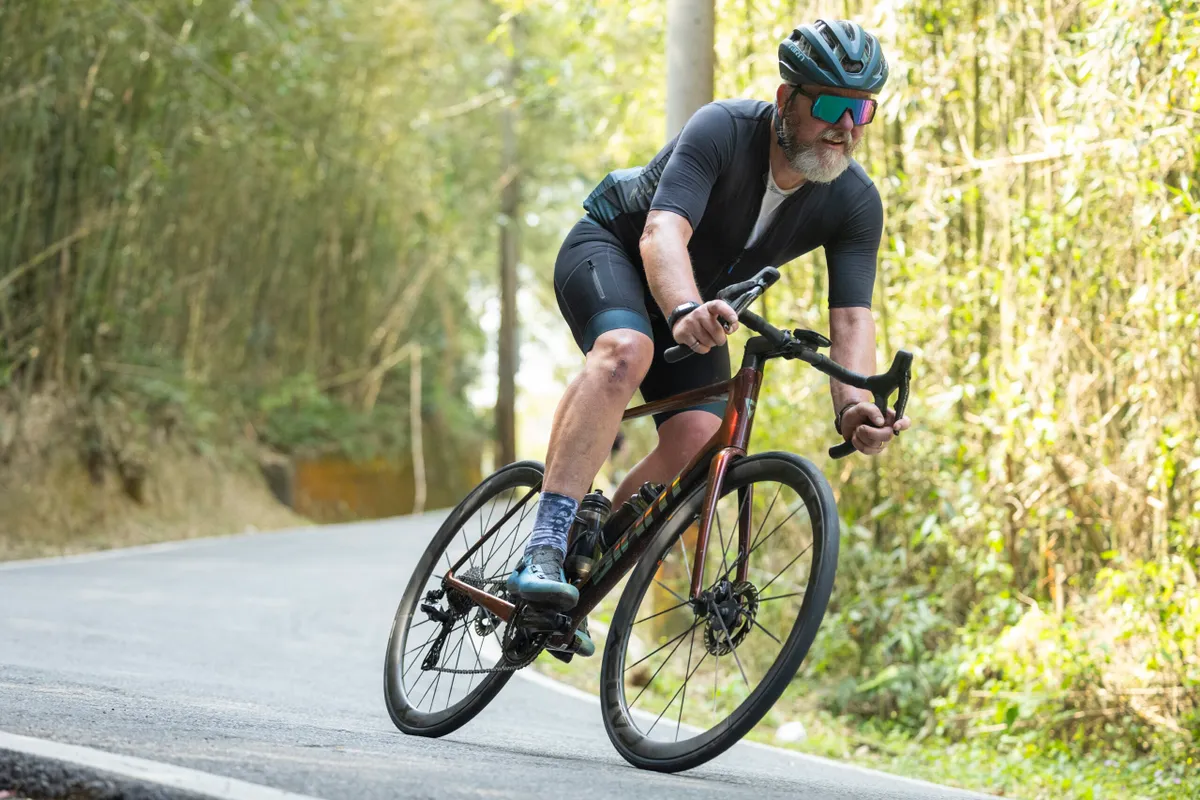
- £11,999 / $12,500 / €12,299 / AU$13,799 as tested
- Pros: Quick; smooth; spotless handling; low weight
- Cons: Expensive in premium build; integrated seat post and press-fit bottom bracket remain
Giant had a hard job to beat the previous TCR, but has managed to do so with the TCR Advanced SL 0 Dura-Ace Di2.
Our size large test bike weighed 6.6kg, including two bottle cages and a computer mount: that's a couple of hundred grams lighter than the old bike.
Meanwhile, the TCR retains its nimble handling and the ride feels a little more compliant.
That said, it probably won't be worth upgrading from the old TCR unless money is no object. And the TCR's integrated seat post and press-fit bottom bracket won't appeal to everyone.
- Read more: Giant TCR Advanced SL 0 Dura-Ace Di2 review
SQUIRREL_13117603
Parlee Ouray

- £14,200 / $14,990 as tested
- Pros: Great handling; road-smoothing feel; light weight; great spec
- Cons: Pricey; one-piece bar combo limits choice for outliers
Parlee's Ouray combines the lightness of a climber, the comfort of an endurance bike and the speed of a race bike – with a sliver of aero to boot.
We found the bike to have impressive handling characteristics and the frame compliance ironed out rough parts of the road.
While its price is seriously high, the spec of the bike reflects this and you can knock £1,500 off for the custom paintjob.
If you're after a bespoke road bike with traditional traits, the Ouray should be on your shortlist.
- Read more: Parlee Ouray review
Specialized S-Works Tarmac SL8 Dura-Ace Di2
SQUIRREL_TEXT_13083773
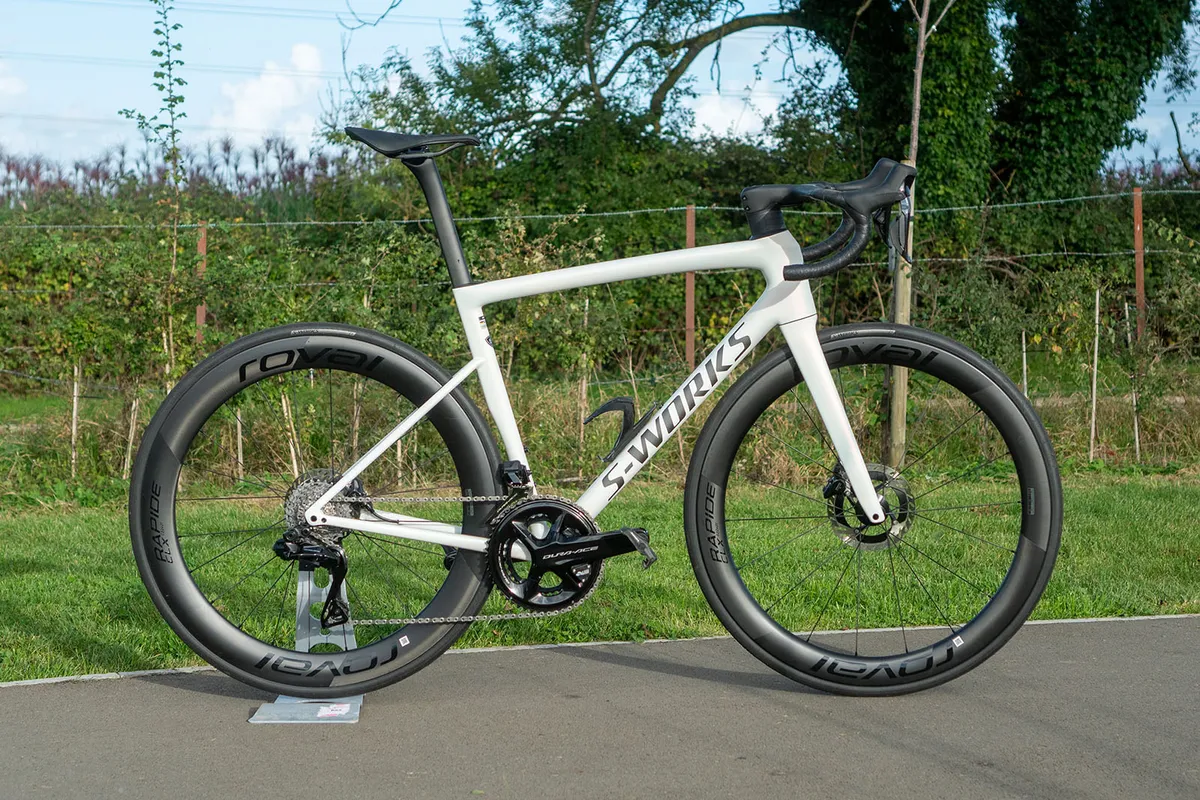
- £12,000 / $14,000 / €14,000 / AU$19,900 as tested
- Pros: Aero bike speed; well-balanced handling; pro-level stiffness
- Cons: Wider tyres would be beneficial; cost
The Specialized S-Works Tarmac SL8 delivers an incredibly balanced ride, with optimum stiffness and comfort. There are few areas the SL8 doesn’t excel in, thanks to its aero bike speed and excellent climbing ability.
This is a no-expense-spared build and, putting the price to one side, it could be the best all-round race bike available. However, our tester cautioned it may not shift the goalposts significantly enough from its predecessor, the Tarmac SL7, to warrant upgrading.
- Read more: Specialized S-Works Tarmac SL8 review
SQUIRREL_13083773
Van Rysel RCR Pro Team Edition

- £9,000 / $10,999 / €9,999 as tested
- Pros: Efficient-feeling at speed; impressive climber; fantastic spec
- Cons: Doesn't quite match value ethos of brand; cockpit might not suit everyone
The RCR Pro Team Edition is Van Rysel's flagship road bike and it lives up to the claims of being a lightweight aero race bike.
While it's not the value proposition we'd hope for from the Decathlon brand, it delivers an impressive ride quality with a dialled geometry and componentry that leaves little to be desired.
We were impressed by the Deda front end, but the current lack of customisation will mean it doesn't work for everyone.
- Read more: Van Rysel RCR Pro Team Edition review
Best aero road bikes
The best aero road bikes are designed to be as slippery as possible, with wind-cheating tube profiles, full integration and stretched-out riding positions. They’re not always the lightest bikes, but they’re certainly the fastest.
Canyon Aeroad CF SLX 7 Disc eTap
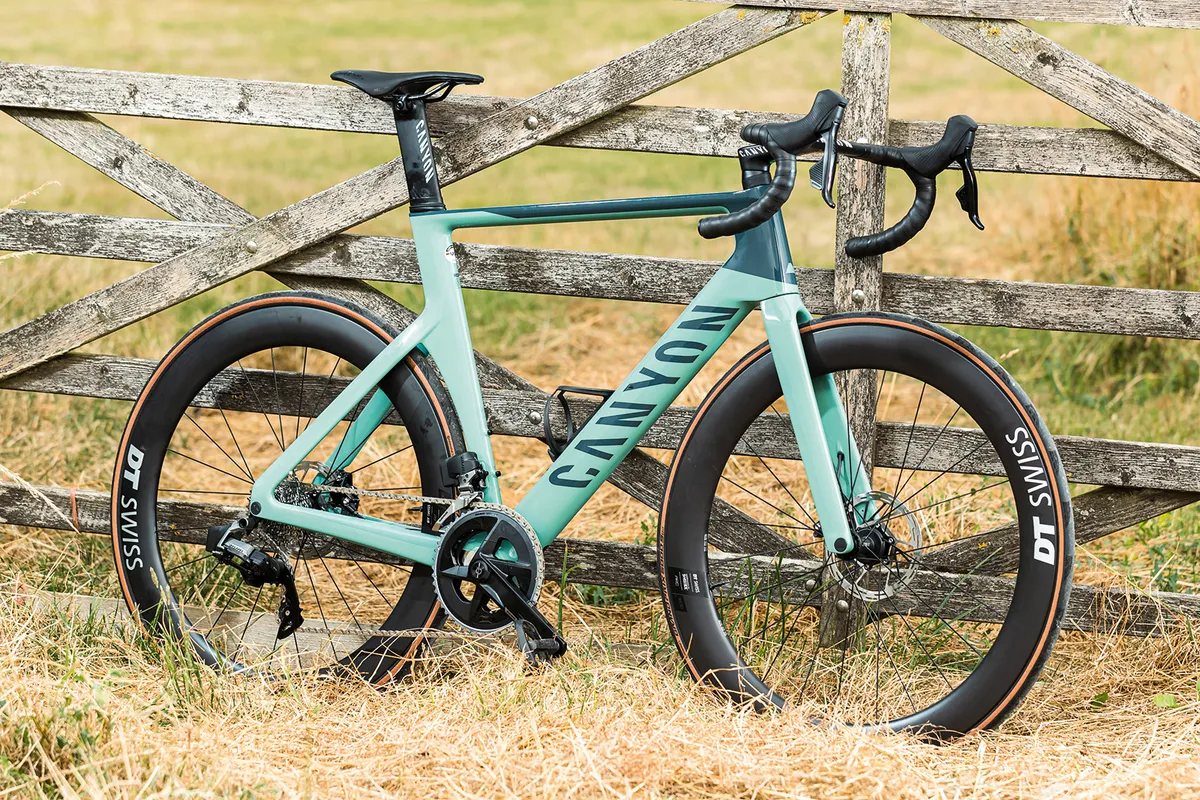
- £4,949 / €4,999 / AU$7,399 as tested
- Pros: Excellent spec; great ride
- Cons: Rotor scrape on our test bike
The Canyon Aeroad CF SLX 7 is an incredibly quick aero bike, but it has enough practicality for everyday performance riding.
The geometry is long and low, but not overly so, and it has a far more forgiving ride than its predecessor.
The spec is excellent, too, with Canyon equipping the bike with DT Swiss wheels and Continental GP5000 S tubeless tyres. We experienced some rotor rubbing in testing, but this isn't too unusual.
- Read more: Canyon Aeroad CF SLX 7 Disc eTap review
Giant Propel Advanced Pro 0 AXS
SQUIRREL_TEXT_13151944
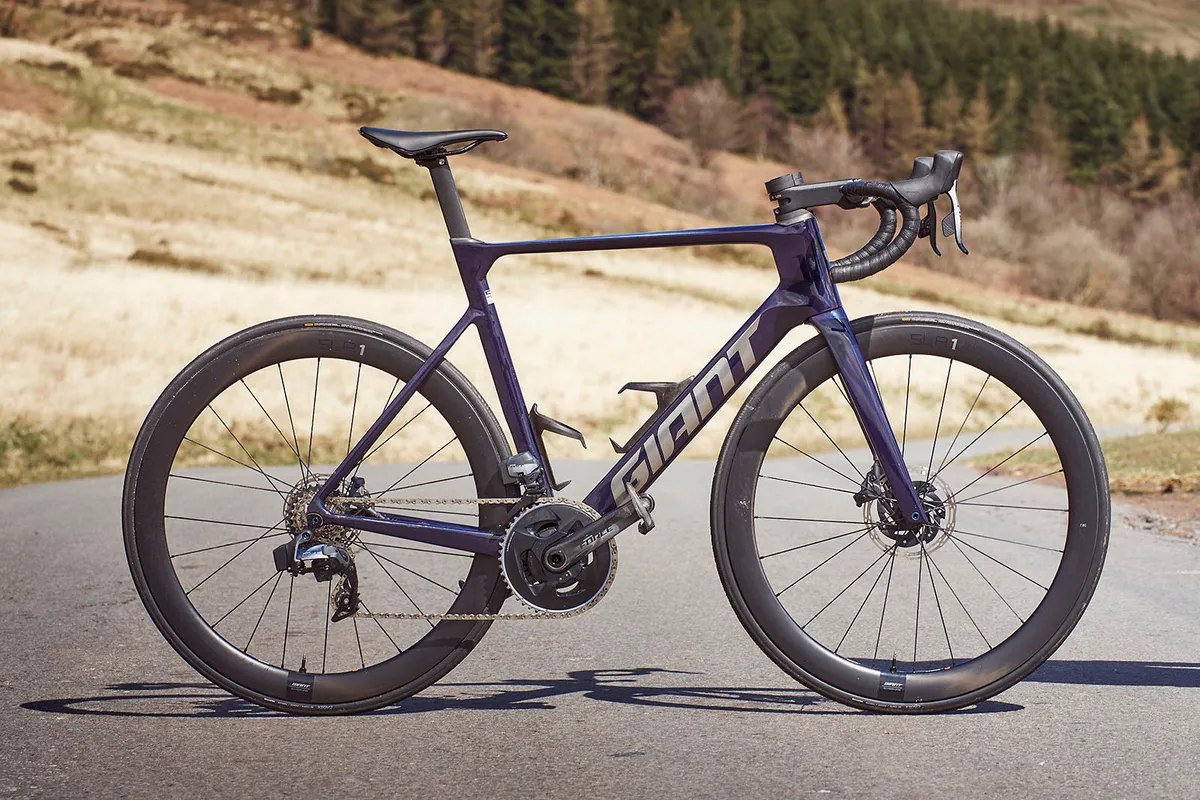
- £6,399 / $8,000 / €6,900 / AU$8,499 as tested
- Pros: Balance of aero and lightweight; great value; fast and confident feel
- Cons: A few old-school spec choices
Delivering all-out speed without excess weight and cost, the Giant Propel Advanced Pro 0 AXS was our Aero Bike of the Year 2023.
Despite being half the price of Giant’s top-spec Propel, it is a close match in terms of performance, proving to be fast on practically all terrain.
The 10-28t cassette and narrow tyres feel fairly old-school, but overall, this bike is a race-ready package with plenty of performance for the price. It’s hard to see why you should spend more.
- Read more: Giant Propel Advanced Pro 0 AXS review
SQUIRREL_13151944
Orbea Orca Aero M10i LTD
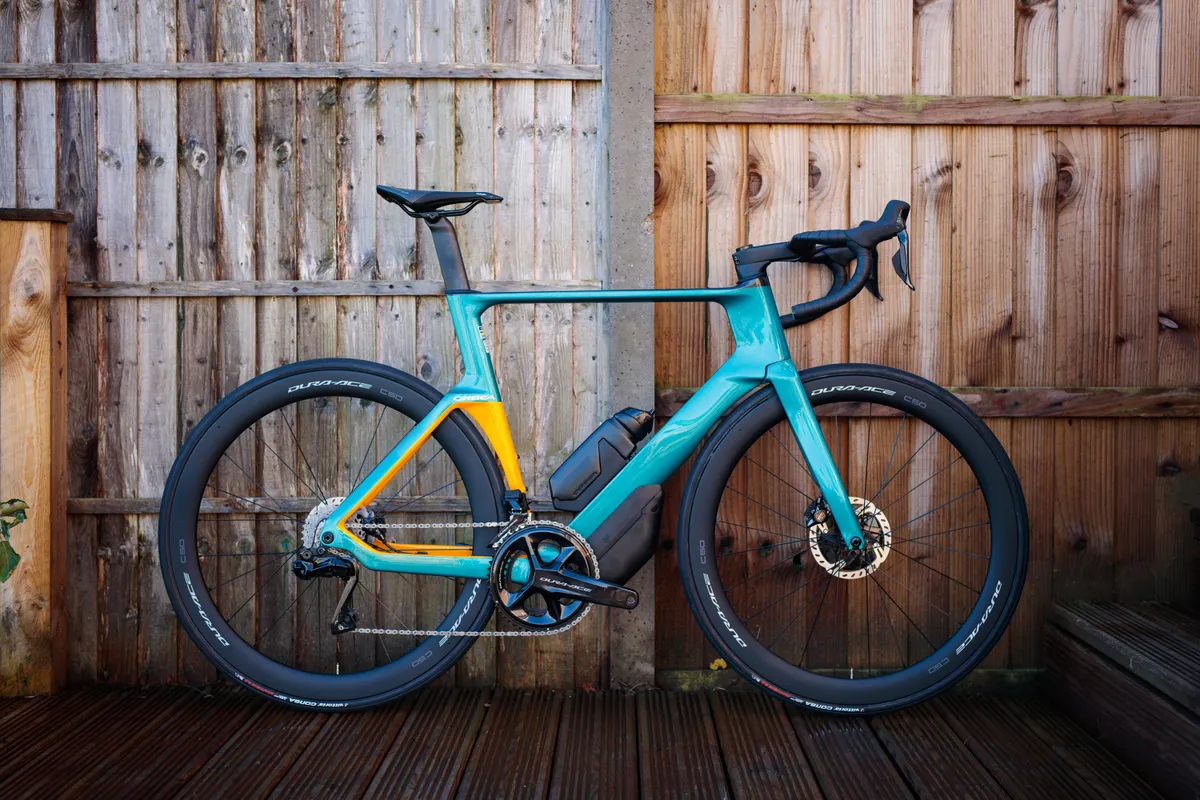
- £9,599 / $9,999 / €9,599 as tested
- Pros: Feels fast; smooth and confident; excellent spec
- Cons: Heavier than the competition
The Orca Aero is inspired by Orbea’s time trial and triathlon bike, the Orbea Ordu, with deep frame tubing, an aero water bottle and a rather novel down tube storage box.
Considering its inspiration, it might not be a surprise that the Orca Aero isn’t the lightest aero bike. But with a geometry similar to the Cannondale SystemSix, it also offers a racy and sharp ride.
Overall, the Orca Aero is impressively quick with a well-thought-out design. It would be a good choice if you’re looking for a bike you can use for general riding as well as time trialling.
- Read more: Orbea Orca Aero M10iLTD review
3T Strada Italia

- £11,462 / $15,899 / €14,951 as tested
- Pros: Impressive comfort; nimble handling; beautiful finish
- Cons: Pricey
The Strada Italia has aero bike efficiency with endurance bike geometry and tyre clearance for all-road duties, delivering impressive comfort.
Despite this, we found the Strada Italia to be a thoroughbred superbike, albeit a hard one to categorise.
Those with professional ambitions might be put off by its relatively relaxed riding position, while endurance riders may be discouraged by the aero tubes. However, both parties would benefit from this bike's unique combination.
It does come at a cost, although the spec of the bike goes some way to making up for that.
- Read more: 3T Strada Italia review
Best women’s road bikes
For various reasons, women’s-specific road bikes are few and far between these days, with many brands now opting for unisex models instead.
But if you do want one, there are still some brilliant options out there.
The best women’s road bikes often feature tweaked geometry and components that match the intended rider, such as narrower handlebars and women-specific saddles.
Liv EnviLiv Advanced 1
SQUIRREL_TEXT_13092424
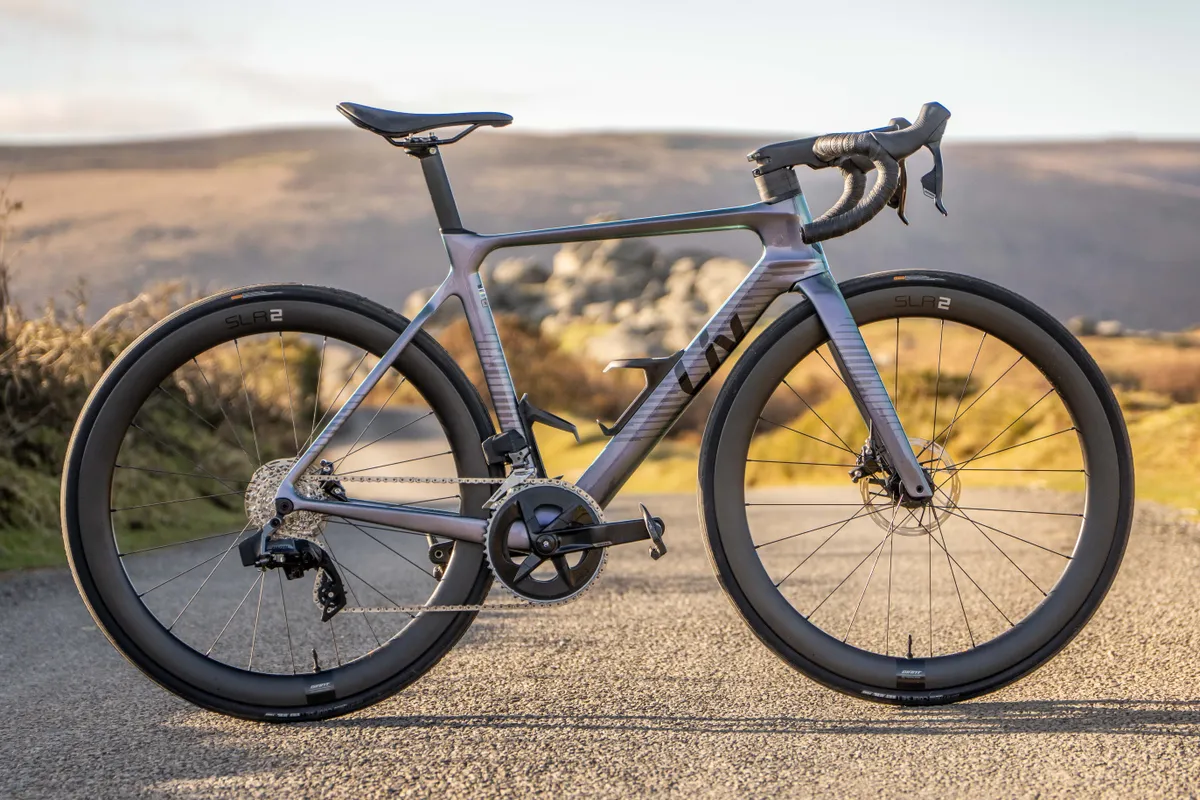
- £4,499 / €4,399 as tested
- Pros: Rapid on flat and undulating terrain; tubeless setup as standard
- Cons: Integrated seat-clamp design
Liv is the sister company of Giant, dedicated to making women’s bikes, and the EnviLiv is the women’s equivalent of the Giant Propel aero bike.
The EnviLiv shares similar speed and acceleration to the Propel but has a women’s-specific geometry and spec. Our tester appreciated how the geometry and women’s saddle helped counteract the stretched-out feel she can have on some road bikes.
She said the EnviLiv is best considered a specialist machine for triathlons, criteriums and road racing, and riders looking for more of an all-rounder should consider the Liv Langma.
- Read more: Liv EnviLiv Advanced Disc 1+ review
SQUIRREL_13092424
Liv Langma Advanced Pro 0
SQUIRREL_TEXT_13092667

- £6,499 / $6,500 / €6,499 / AU$8,199 as tested
- Pros: Frame-size proportional bar width; reassuring handling; set-up tubeless out of box
- Cons: Bottle cages not included, as on other models
The Langma Advanced Pro 0 is the third version of Liv's premier all-round race bike with minor updates elevating it above its predecessors.
Brake and gear cables are now fully integrated and tyre clearance is up from 32mm to 33mm. Liv specs narrower handlebars wrapped in comfier tape and deeper section wheels.
These changes make the Langma Advanced Pro 0 feel faster yet just as compliant.
- Read more: Liv Langma Advanced Pro 0 review
SQUIRREL_13092667
Scott Contessa Addict 25
SQUIRREL_TEXT_13151943
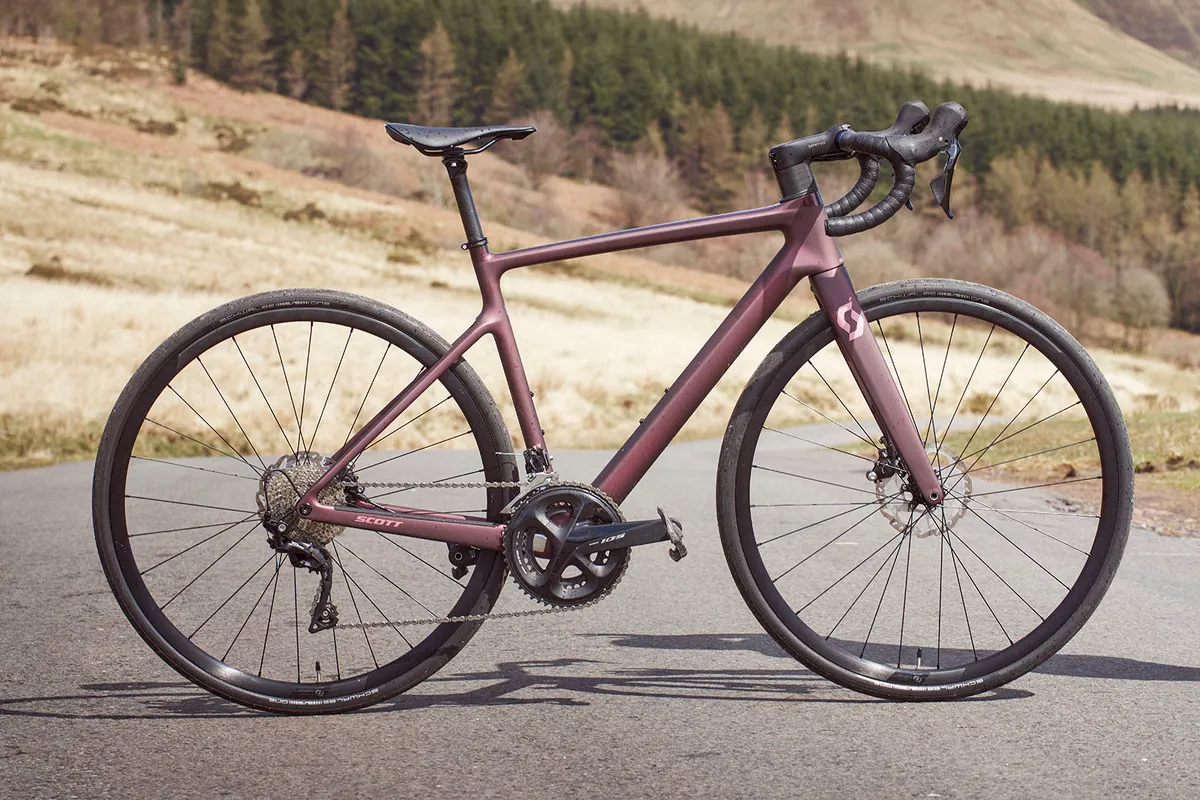
- £2,499 / $2,800 / €2,800 as tested
- Pros: Responsive, especially when climbing; value for money; hidden mudguard mounts
- Cons: Tyres not tubeless-compatible
The Scott Contessa Addict 25 won our Women’s Bike of the Year Award 2023, thanks to its well-considered build, lively yet comfortable ride and great price.
The carbon bike’s geometry is towards the racier end of endurance road bike and our tester found it to be no slouch, responding well to being ridden at pace.
The mechanical Shimano 105 groupset, wide gear range and hidden mudguard mounts make this a capable, versatile bike that will serve you well for miles of riding.
- Read more: Scott Contessa Addict 25 review
SQUIRREL_13151943
Best budget road bikes
The best budget road bikes major in practicality and versatility, with accessory mounts that will make commuting a breeze and often generous tyre clearances for light off-road riding.
Boardman ADV 8.9
SQUIRREL_TEXT_13101377
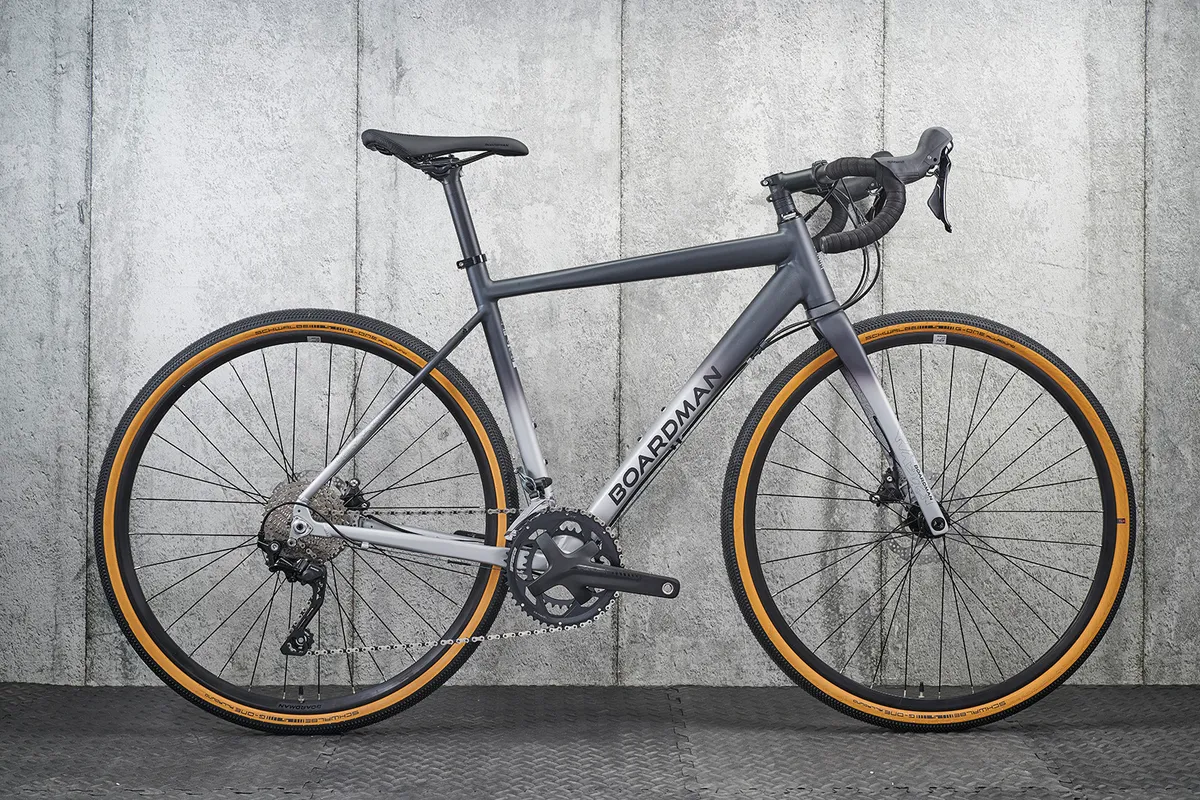
- £1,150 as tested
- Pros: Great handling; excellent spec; willing ride
- Cons: Vibrations through the handlebar
The Boardman ADV 8.9 is a class-leading all-rounder, able to handle road, gravel riding and more.
It has a willing ride that will encourage you along on tarmac, but it has enough tyre clearance and mounts for bikepacking across rougher terrain too.
The aluminium frame is built up with a great spec for the price, including GRX derailleur, Promax disc brakes and WTB Riddler tyres.
- Read more: Boardman ADV 8.9 review
SQUIRREL_13101377
Giant Contend 1
SQUIRREL_TEXT_13081205
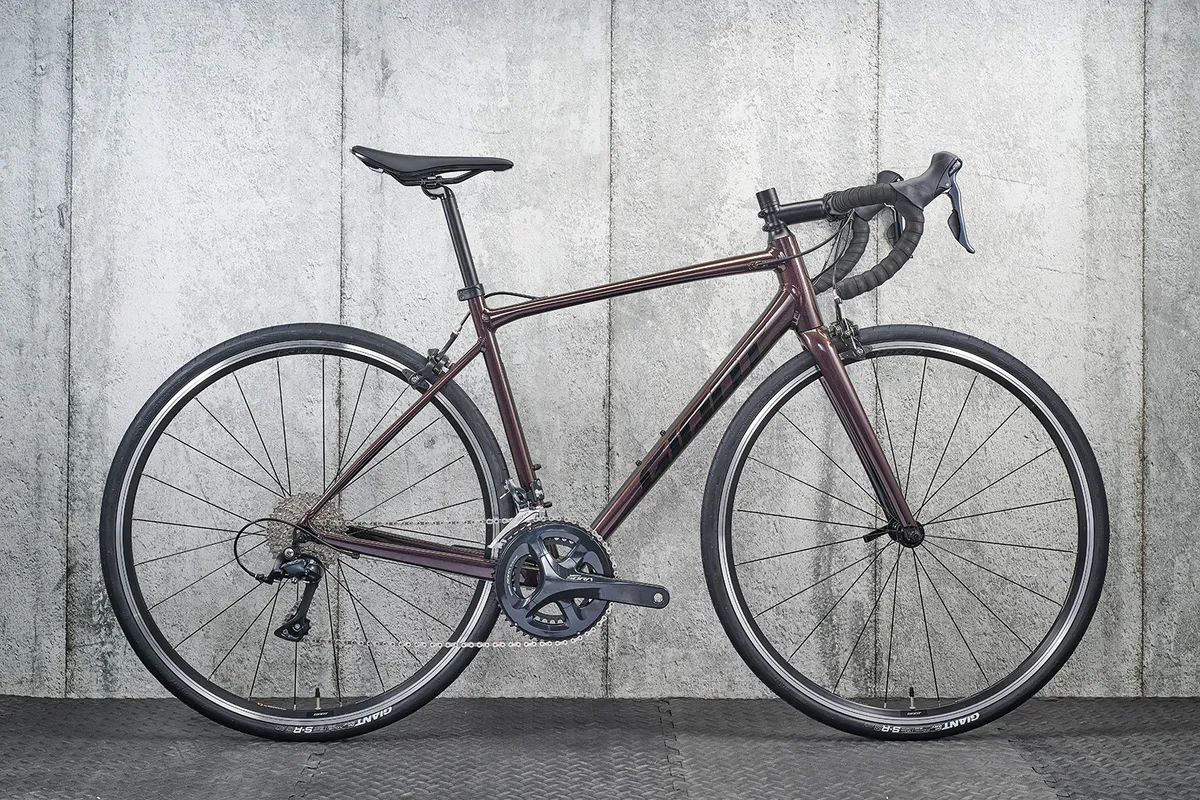
- £999 as tested
- Pros: Slick groupset; enjoyable, rewarding ride
- Cons: Vibration damping
Coming in at just under £1,000, the Giant Contend 1 is a great road bike for the money, with a slick Shimano Sora drivetrain and a frame that mimics the shapes of the Giant TCR.
It has an enjoyable, rewarding ride, even if the front end is slightly harsh, and offers everything a well-priced road bike should.
Many of the best road bikes now feature disc brakes. But the Contend’s rim brakes are a wise, practical choice at this price, offering good stopping power and easy servicing.
- Read more: Giant Contend 1 review
SQUIRREL_13081205
Triban RC 500
SQUIRREL_TEXT_13115998
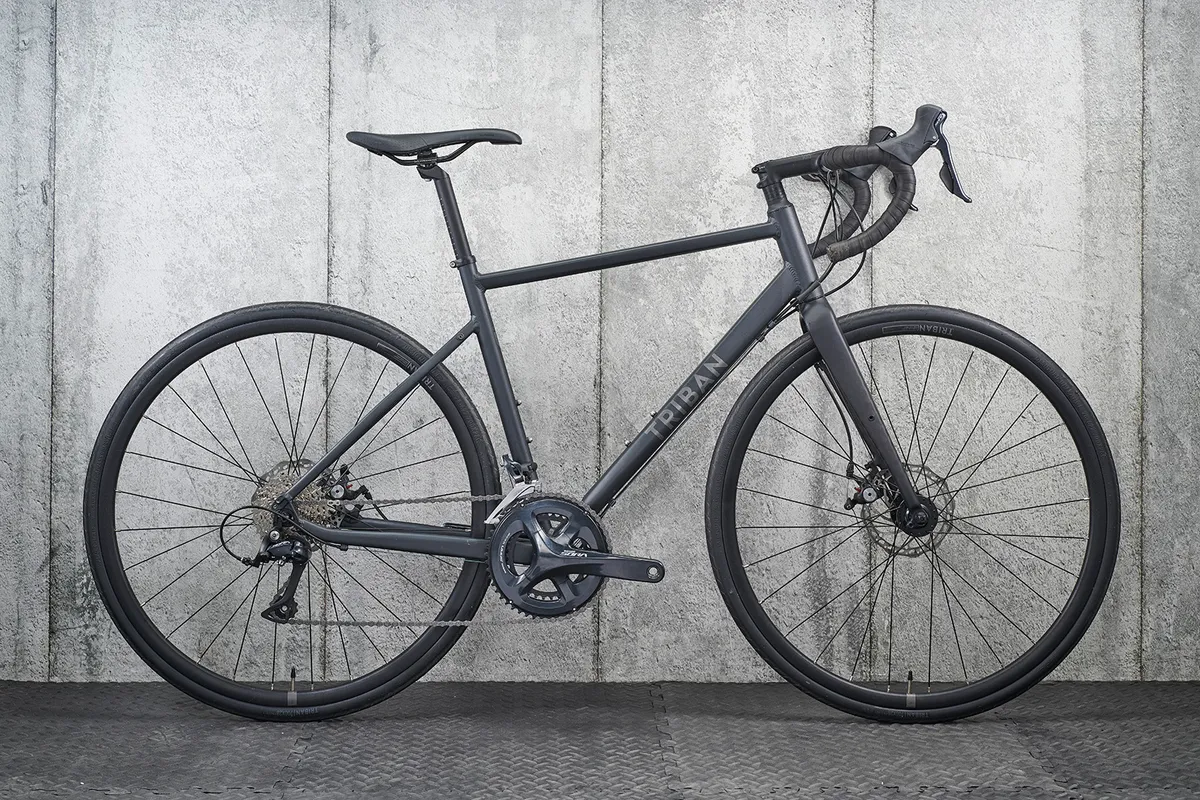
- £650 as tested
- Pros: Shimano Sora; good brakes; versatile
- Cons: Slightly weighty
Triban is Decathlon’s entry-level bike brand and its RC 500 is an impressive bike for its low price tag, with a Sora drivetrain, good brakes and a great ride.
Our tester appreciated the laid-back and endurance geometry on longer rides.
It might not be sporty enough for chasing down your Strava rivals, but its comfort and practicality, including mounts for mudguards and racks, make it ideal for year-round commuting. It could even handle adventurous trips away.
- Read more: Triban RC 500 review
SQUIRREL_13115998
Cannondale CAAD Optimo 1
SQUIRREL_TEXT_13151965
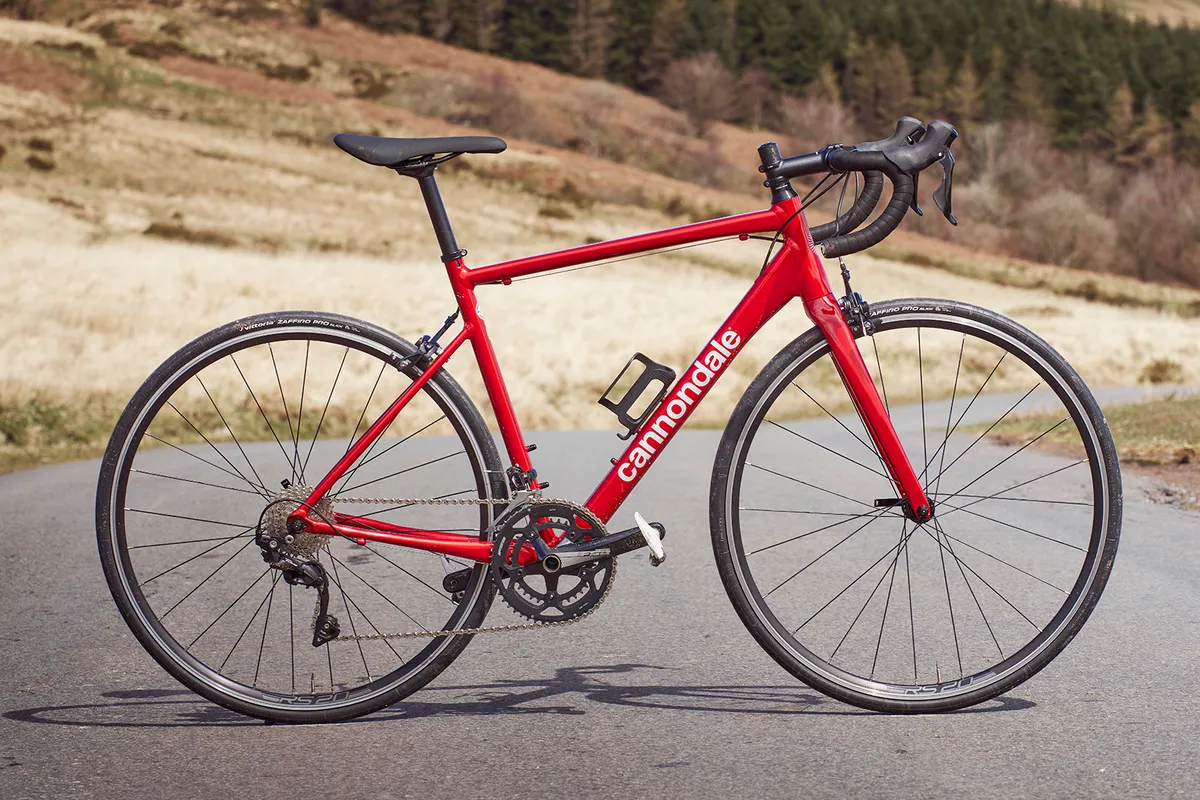
- £1,300 / $1,305 / €1,499 as tested
- Pros: Low weight; smooth and balanced ride
- Cons: Not a complete 105 groupset
The Cannondale CAAD Optimo 1 won our Budget Road Bike of the Year category in 2023.
Cannondale has a reputation for high-quality aluminium bikes – for instance, the CAAD13 – and the Optimo lives up to that legacy with an excellent frame.
The frame is matched with good components, including a 105-based groupset, which all comes together to create a light and smooth bike that's satisfying to ride.
- Read more: Cannondale CAAD Optimo 1 review
SQUIRREL_13151965
Specialized Allez Sport
SQUIRREL_TEXT_13120224
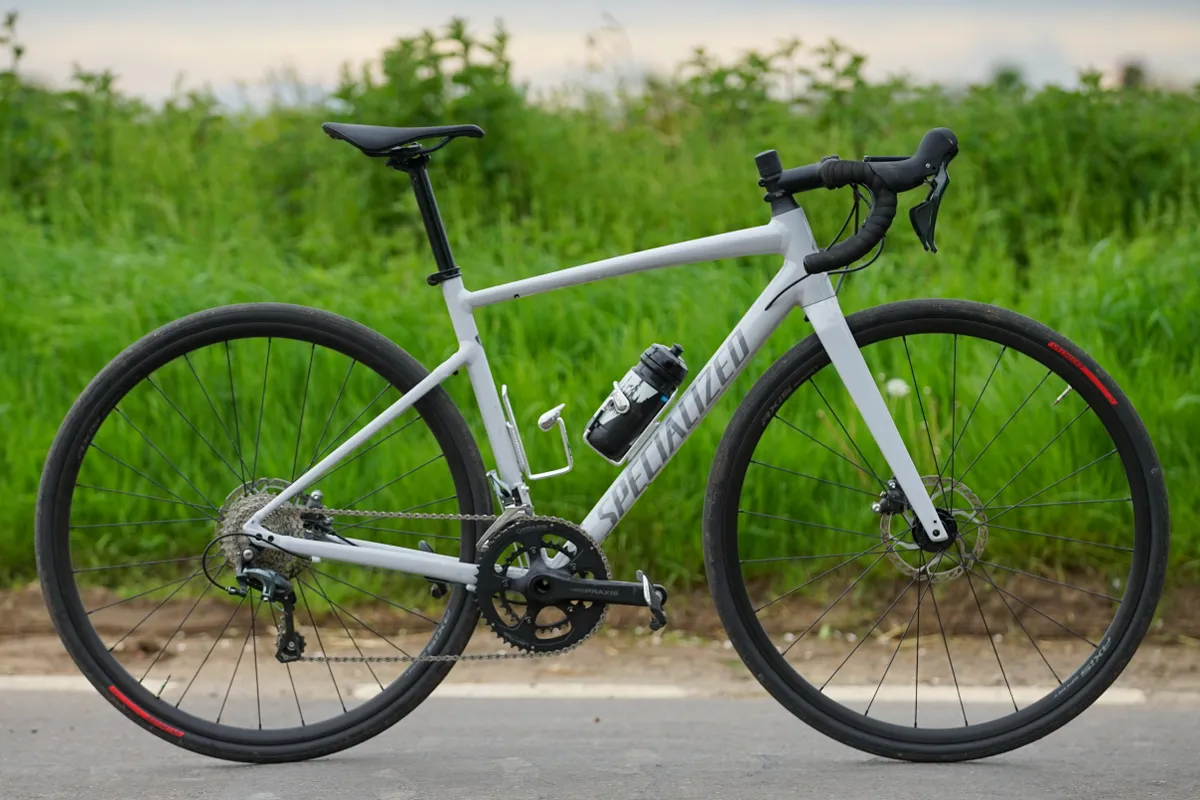
- £1,600 / $1,800 / €1,750 / AU$2,500 as tested
- Pros: 35mm tyre clearance; mudguard and rack mounts; accessible geometry
- Cons: Wheelset and tyres
The Specialized Allez Sport would make an ideal first road bike or winter trainer.
The aluminium frame’s geometry translates to a stable yet reactive ride, with the tall head tube keeping you in a comfortable position.
The generous tyre clearance, ad mudguard and rack mounts, make this a truly versatile bike. It’s just a shame the wheels and tyres aren’t of a higher spec.
- Read more: Specialized Allez Sport review
SQUIRREL_13120224
Trek Domane AL 2 Gen 4
SQUIRREL_TEXT_13123797

- £1,050 / $1,200 / €1,199 / AU$2,000 as tested
- Pros: Steady handling; upgradable and adaptable frame; crisp shifting
- Cons: Mechanical disc brakes
Like more expensive Domanes, the Trek Domane AL 2 Gen 4 is a practical, comfortable and playful endurance road bike.
Clearance for 38mm tyres, mudguard mounts and top tube bag fixings augment the alloy Domane's versatility. Winter road cycling, bikepacking and commuting are all within its capabilities.
The lively frameset is worth upgrading, but to switch to hydraulic disc brakes, you'll have to swap the entire drivetrain. This is a shame because the Shimano Claris gears shift well.
- Read more: Trek Domane AL 2 Gen 4 review
SQUIRREL_13123797
How we test road bikes

We’ve been testing road bikes since BikeRadar’s inception in 2007, tracking every major development in road bike tech, from the advent of electronic groupsets to the widespread adoption of disc brakes.
We’ve tested all the major road bikes of the last 17 years, from the first gravel bikes to the latest aero road bikes, covering everything from budget rides to pro-level superbikes.
Since BikeRadar was founded, we've reviewed more than 15,000 bikes and products, and our annual Bike of the Year test has become an industry benchmark.
Working with our colleagues at Cycling Plus magazine, our road bike reviews are always editorially independent – with no exceptions. Our reviewers comprehensively test each bike, always reflecting on performance, value and the wider market when delivering their verdict.
Our current testers are widely respected by the cycling industry, with our senior technical editor, Warren Rossiter, judging the best bikes at Eurobike, the world’s largest cycling trade show.
How to choose a road bike by price
Best road bikes under £750 / $750

Getting into road riding needn't cost you a fortune. Even just £350 / $350 will buy you a bike that will get you started with the world of road riding, although spending even slightly more will get you a significantly better bike.
Our full buyer's guide to the best cheap road bikes is a great place to start, and we've got tips for second-hand bike buyers, too.
Best road bikes under £1,000 / $1,000

The best road bikes under £1,000 are a great place to start if you have a bit more cash and are new to cycling, or if you're unsure how much riding you’re going to be doing.
Best road bikes under £2,000 / $2,000
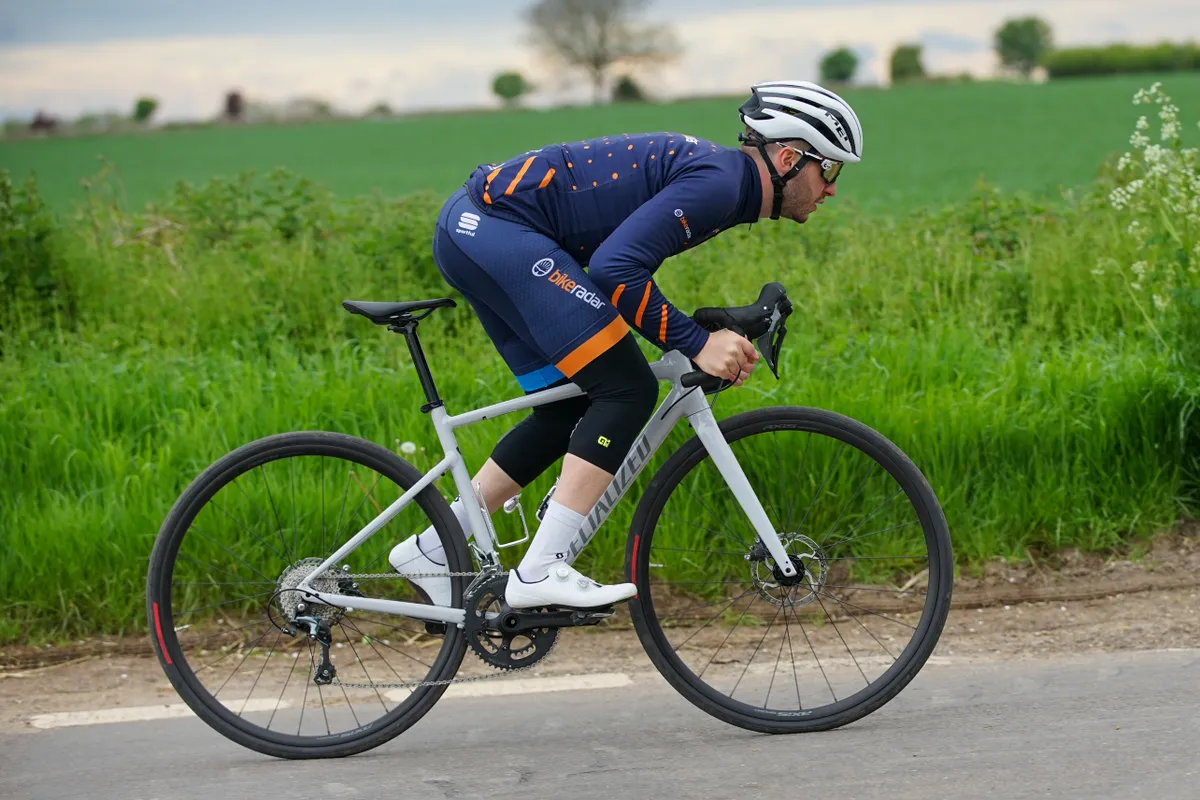
The pro-level superbikes that fall into the price range beyond this bracket are truly amazing and it’s easy to be tempted by them.
But don’t worry if you can’t get your hands on one without remortgaging your house because the best road bikes under £2,000 still bring you into great bike territory.
Best road bikes under £3,000 / $3,000
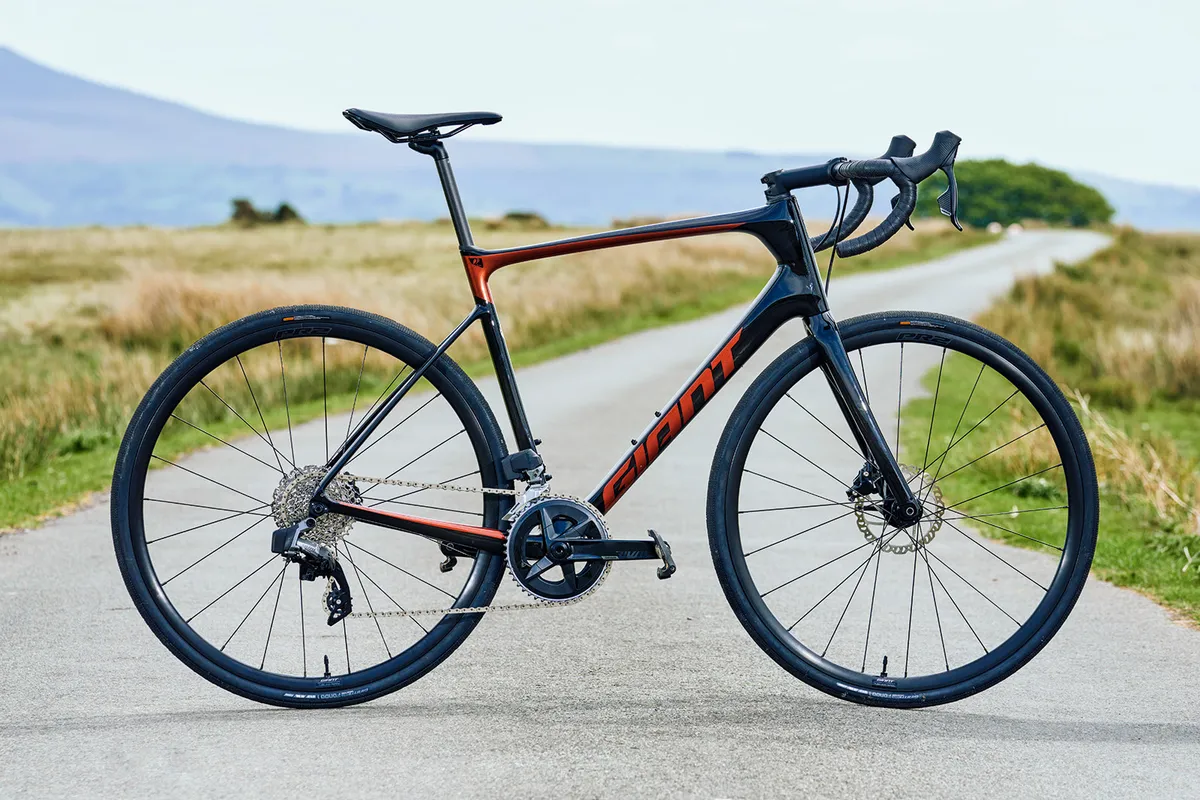
This sort of price range used to be the sole preserve of the dedicated race bike. But the profile of this section of the market has changed and the best road bikes under £3,000 are now just as likely to be sportive/endurance models.
Road bike buyer’s guide
What kind of road bike should I buy?
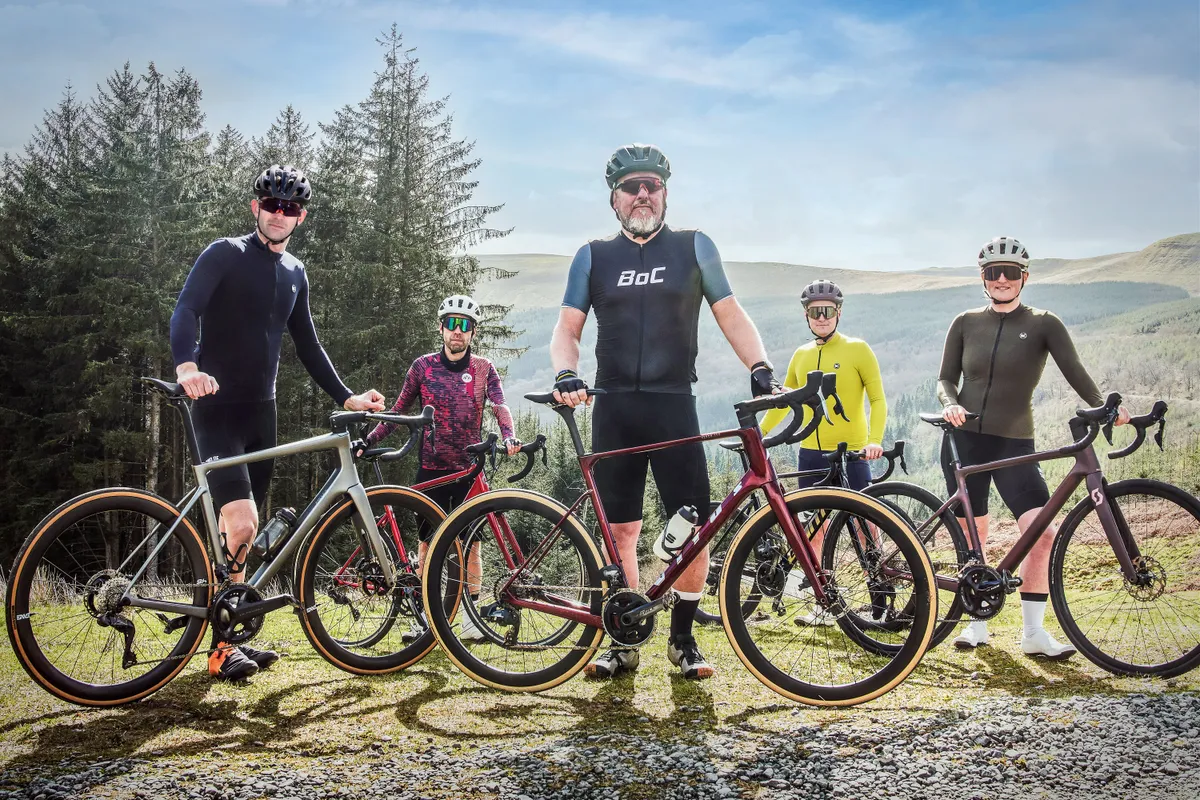
Road bikes fall into two general broad categories: race and endurance.
Race bikes put the rider’s torso in a lower, more aerodynamic position and typically have more aggressive geometry for quick handling.
Endurance road bikes put the rider in a more upright position and the frame angles are a little more relaxed for confidence-inducing stability and long-distance comfort. These are sometimes also known as sportive bikes.
All-road bikes are becoming a burgeoning category and largely mimic an endurance bike but offer larger tyre clearances, although not quite to the extent of gravel bikes.
In either category, you should expect to pay between £500 / $500 and £1,000 / $1,000 for a high-quality, entry-level machine that will give you years of trouble-free service.
The best way to learn the difference between the two is to ride both, either through test rides at an event or a shop, or by borrowing a bike from a friend.
Niche sub-categories

Underneath these two broad categories are more niche categories, tailored to more specific demands.
There are two main sub-categories of race bikes. Aero bikes will provide out-and-out speed. The best climbing bikes prioritise low weights over aerodynamics.
The best winter road bikes tend to fall into the endurance category and you could make a case for the best touring bikes to be in this category, too.
A growing category of road bikes is electric road bikes, which have motors to help assist you on your ride.
What are road bike frames made from?
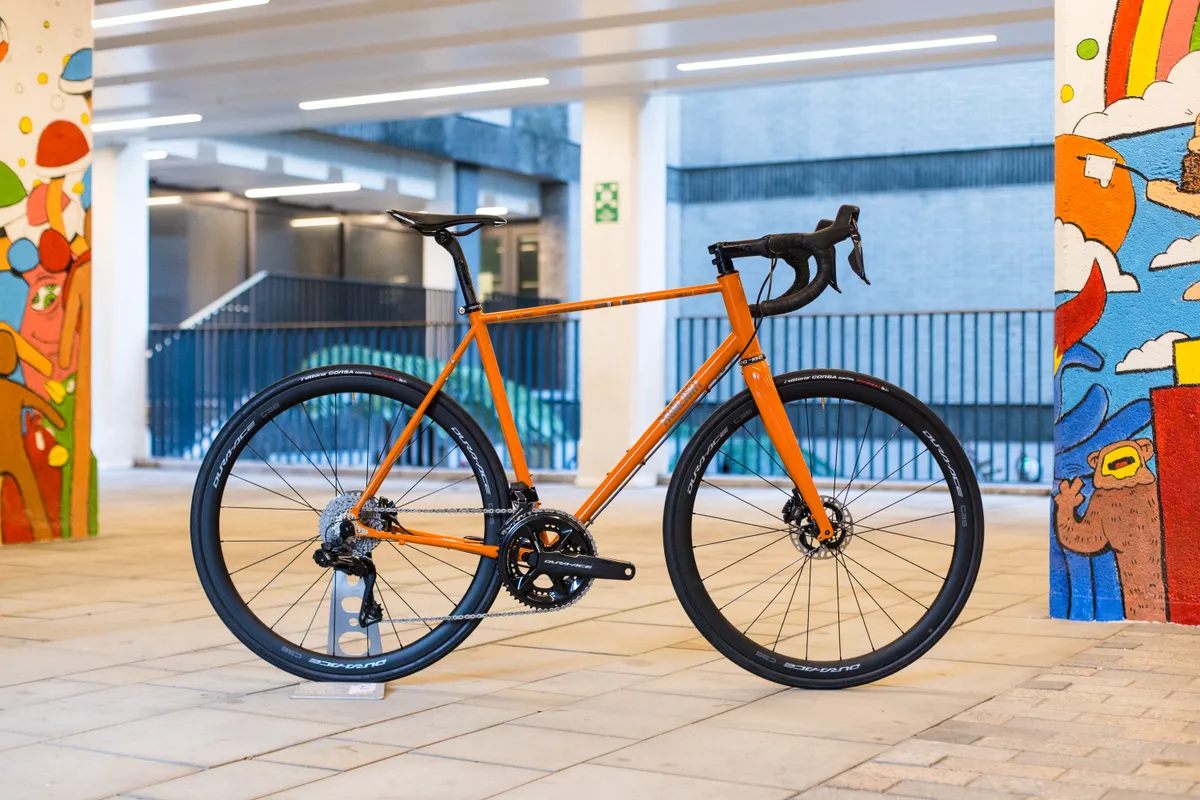
One of the main differences between road bikes will be the material used to make the frame.
Many of the most expensive road bikes will be made from carbon fibre, because it has a high strength-to-weight ratio, allowing brands to create lightweight and efficient bikes.
The best aluminium road bikes can offer a ride experience and a similar level of performance to carbon road bikes but are generally more affordable, due to aluminium being a cheaper material. They do tend to be heavier, though, but not always by that much.
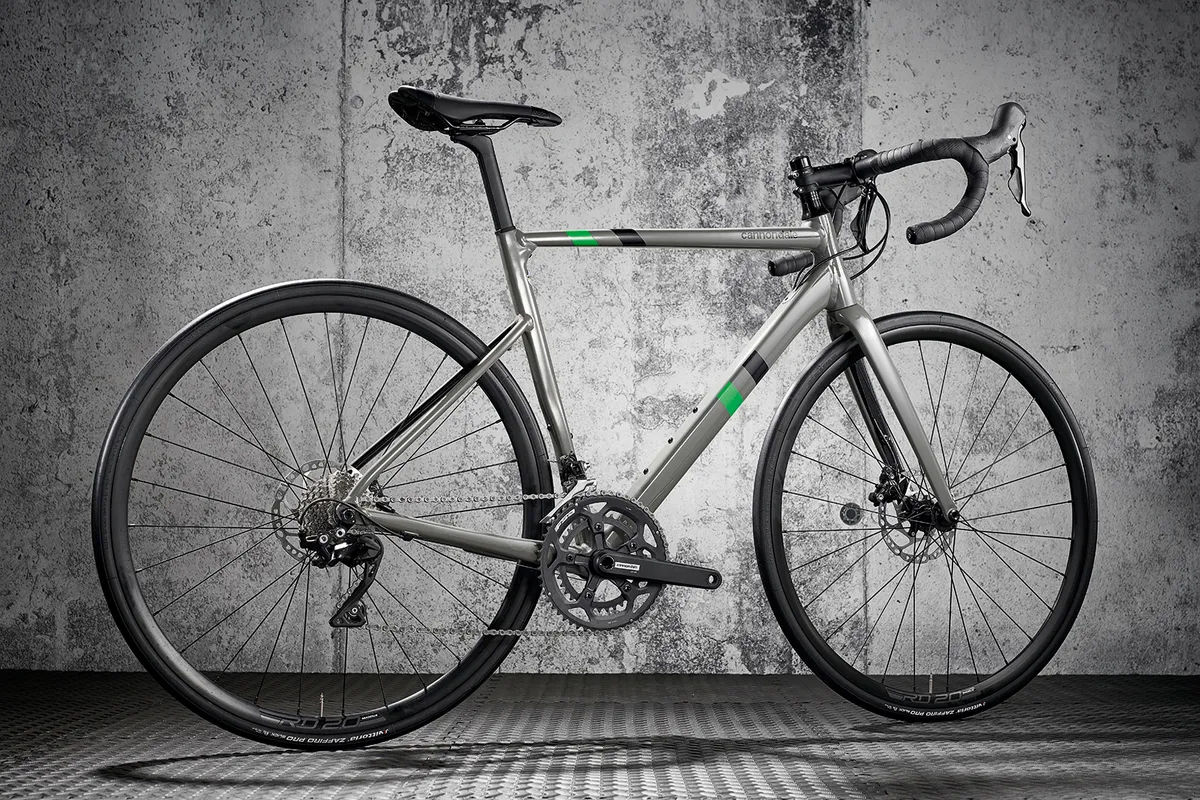
Many of the most affordable road bikes are made from aluminium.
The best steel road bikes offer classy and classic looks, and many riders say this frame material gives a ride quality like no other, absorbing bumps in the road while providing a ‘zingy’ ride feel.
The best titanium road bikes are often a large investment due to the difficulty of working the material. But, like steel, they are desirable for their unique feel, appealing looks and their exclusivity.
Road bike groupsets explained
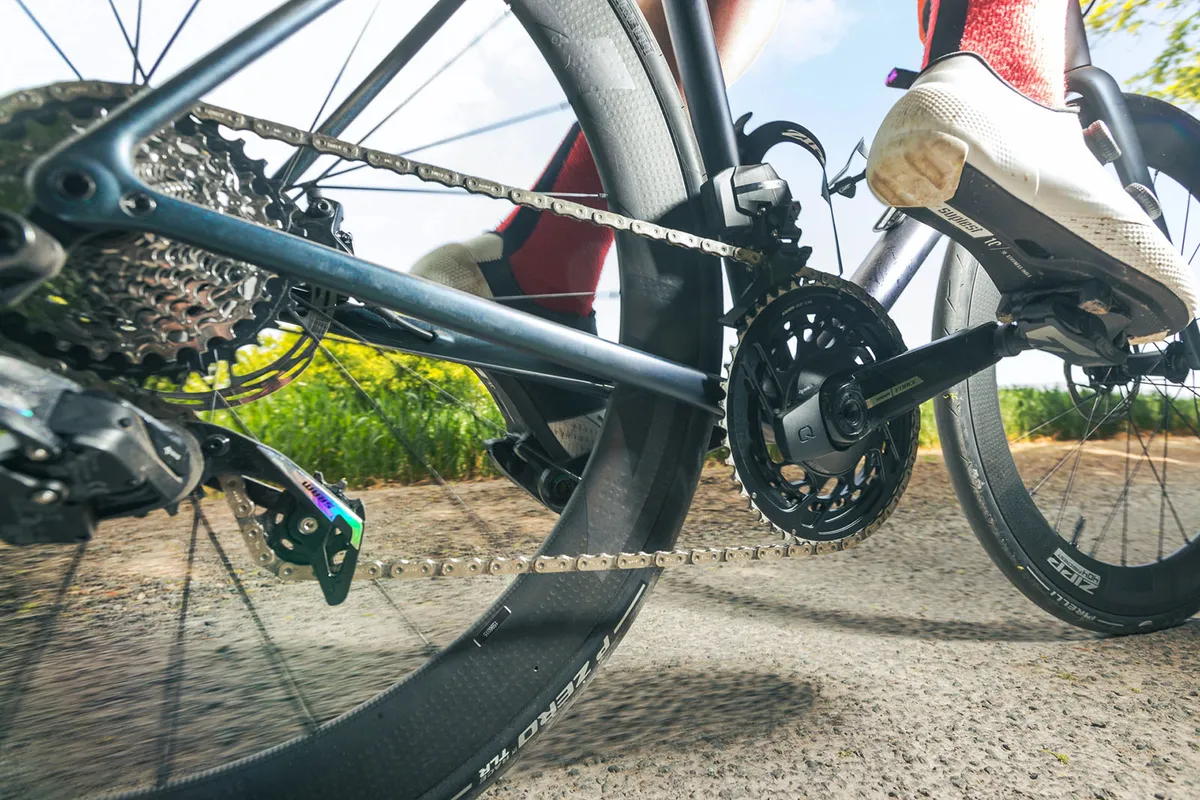
Road bike gearing has evolved considerably. Most road bike drivetrains now have two chainrings and between nine and 12 cogs – or now, even 13 – in the rear.
Shimano and SRAM are, by far, the most common drivetrain brands, although you will find Campagnolo, Microshift and FSA components out there too.
In general, endurance bikes have smaller gears, meaning it’s easier to get up hills, while race bikes have larger gears for higher top-end speed.
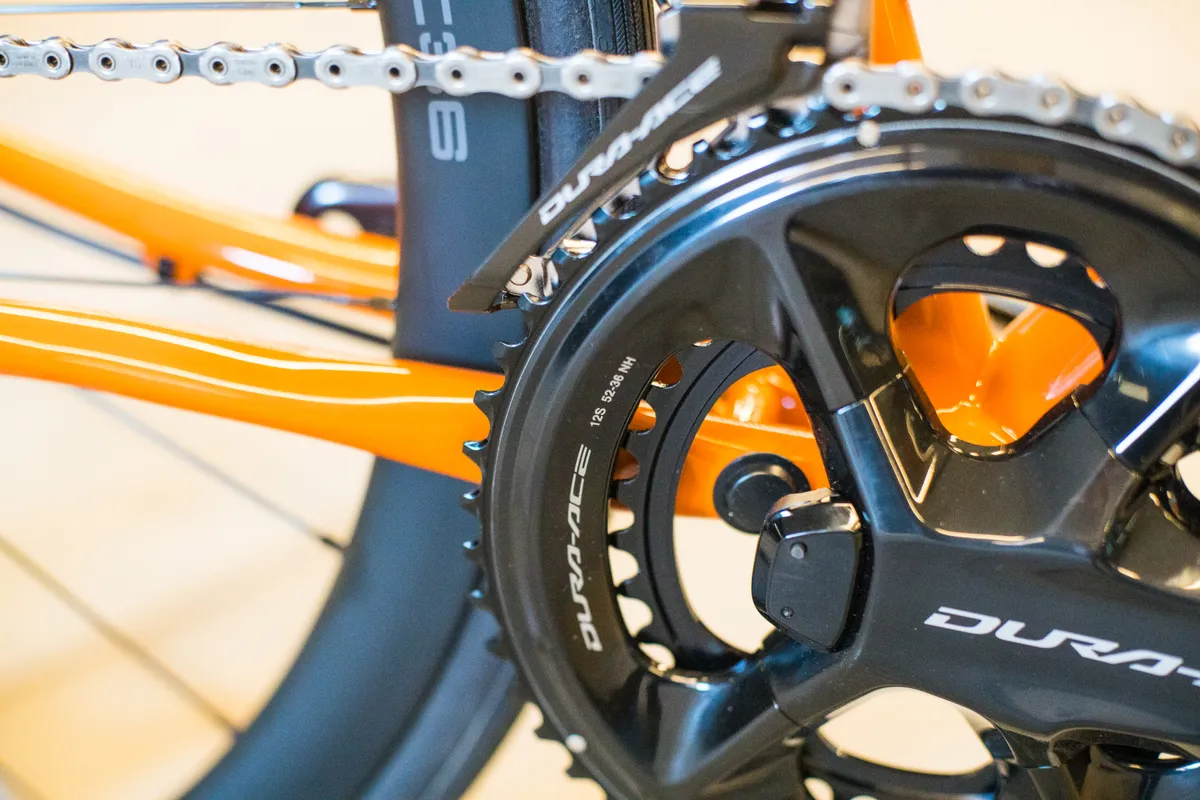
Bigger chainrings mean more outright speed (and effort), and smaller chainrings – dubbed compact – mean less effort.
Some road bikes use 1x drivetrains, which omit a front derailleur and have a wider cassette range, although this is more popular on gravel bikes.
For a detailed breakdown of the options, see our buyer’s guide to road bike groupsets.
Rim brakes or disc brakes?
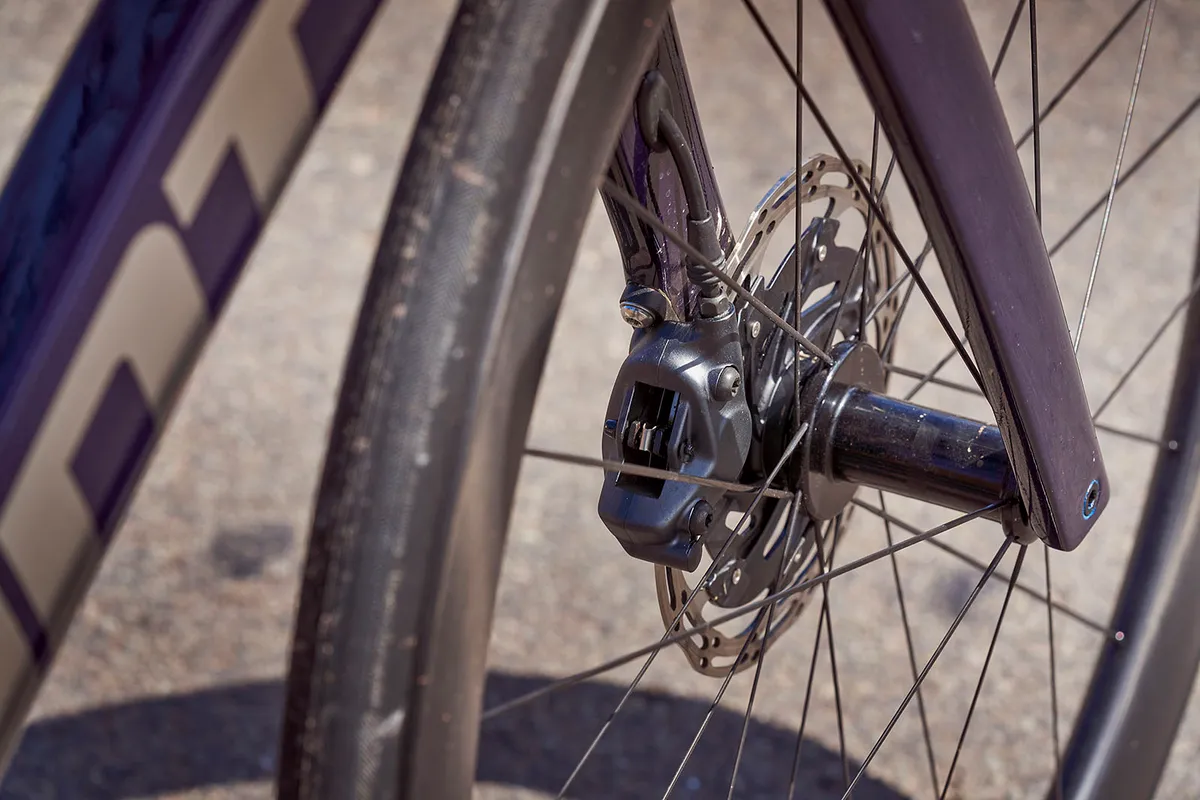
For decades, road bikes used caliper rim brakes, where blocks of rubber squeezed against the rims.
Now, however, the majority of mid-range and high-end road bikes come equipped with disc brakes, which have been used on mountain bikes for many years.
The disc brakes vs. rim brakes debate is endless but, in short, discs offer superior braking in wet weather, but are heavier and slightly more hassle to maintain.
Rim brakes are still common on more affordable bikes, and they remain a perfectly viable option for many riders.
Note that the majority of rim brake bikes cannot be converted to discs and vice versa, so once you’ve made your choice, you’re committed to it.
Aluminium or carbon fibre wheels?
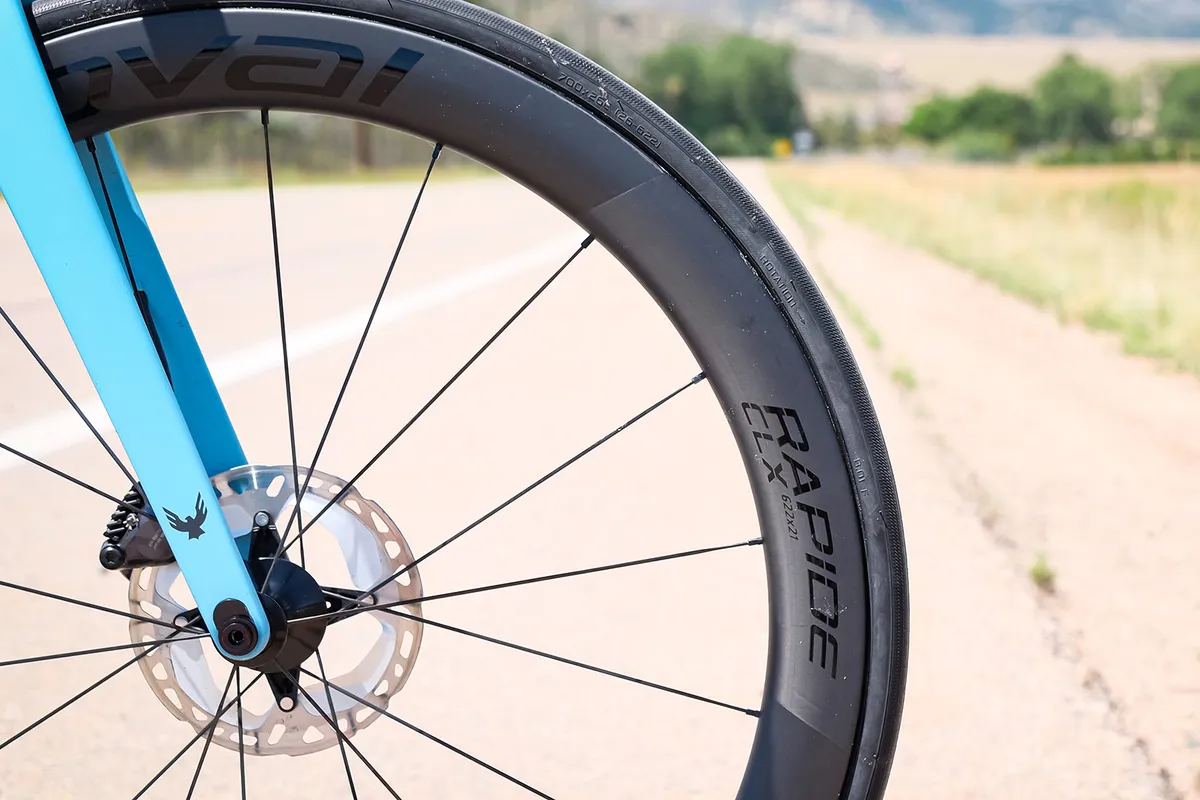
With few exceptions, road bikes will come with 700c wheels with either aluminium or carbon fibre rims.
Aluminium rims come as standard on many road bikes, particularly at the lower end of the price spectrum, because they are relatively cheap to produce.
Carbon rims are becoming increasingly common on new, complete bikes. Wheels with carbon rims can be even lighter than those with aluminium rims. They can be more aerodynamic too, because the high strength-to-weight ratio of the material means manufacturers can create ‘deep-section’ rim profiles that aren’t prohibitively heavy.
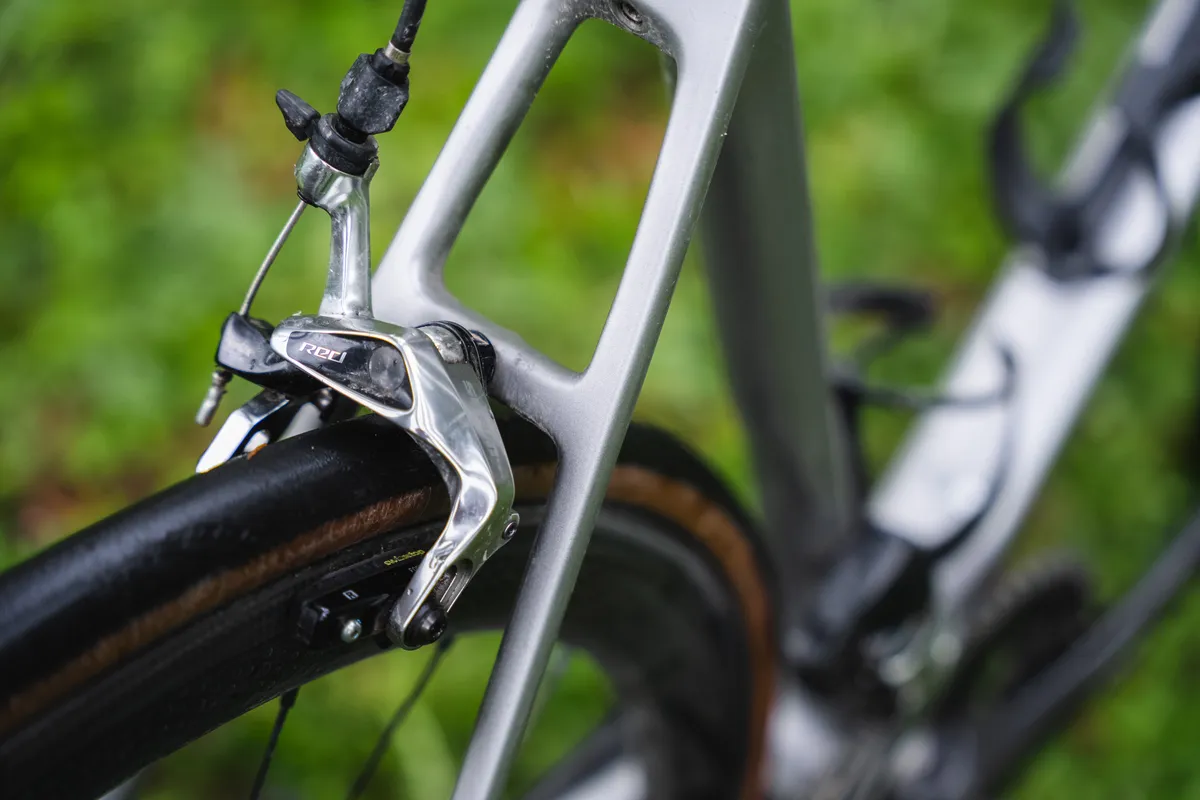
If you have a rim brake bike, the rim material itself takes the brunt of the braking force. This makes aluminium rims a popular choice because when the rim eventually wears down through use, it's cheaper to replace aluminium rims than carbon rims.
Aluminium rims also provide a better braking surface than carbon rims in wet conditions, so many riders will fit aluminium rims to their bike in winter, saving their wheels with carbon rims – if they have them – for summer.
The growing popularity of disc brakes has made much of the debate between aluminium and carbon rims redundant, however. Because disc brakes bind with a metal rotor attached to the wheel rather than the rim itself, riders can now opt for carbon rims regardless of weather conditions or season.
What tyres will my road bike come with?
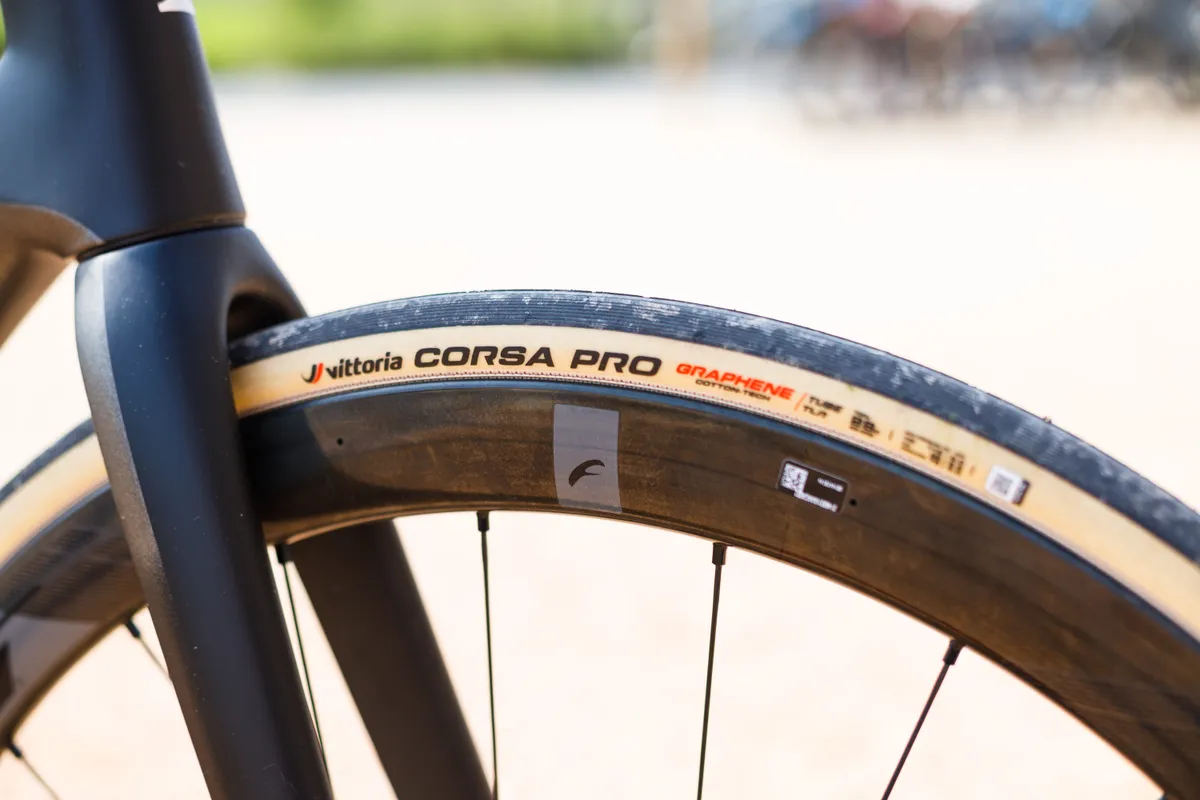
Most road bikes come with slick or very lightly treaded tyres.
While extremely narrow tyres used to be commonplace, it’s become more common to spec wider tyres on road bikes in recent years. Race bikes are often fitted with 25mm-wide tyres, while endurance bikes come with 28mm or even 32mm tyres.
Regardless of the width, all of these tyres will roll fast and the wider tyres give you a little more cushioning (and speed over rougher road surfaces) in exchange for a little more weight.
The best road bike tyres will offer a combination of speed (low rolling resistance), grip and puncture resistance.
Tyres are one of the easiest things to change and one of the best bike upgrades. So you don’t need to worry much about what the bike comes with. That said, if you are keen on maximising the comfort of your bike, make sure the frame has clearance for wider tyres.
Again, race bikes that favour aerodynamics will typically skew towards skinny tyres, while the endurance bikes that deliver comfort will generally have plump rubber.
If you’re unsure how to pump up your tyres or how to change your tyres, check out our comprehensive guides.
How to get the correct road bike size
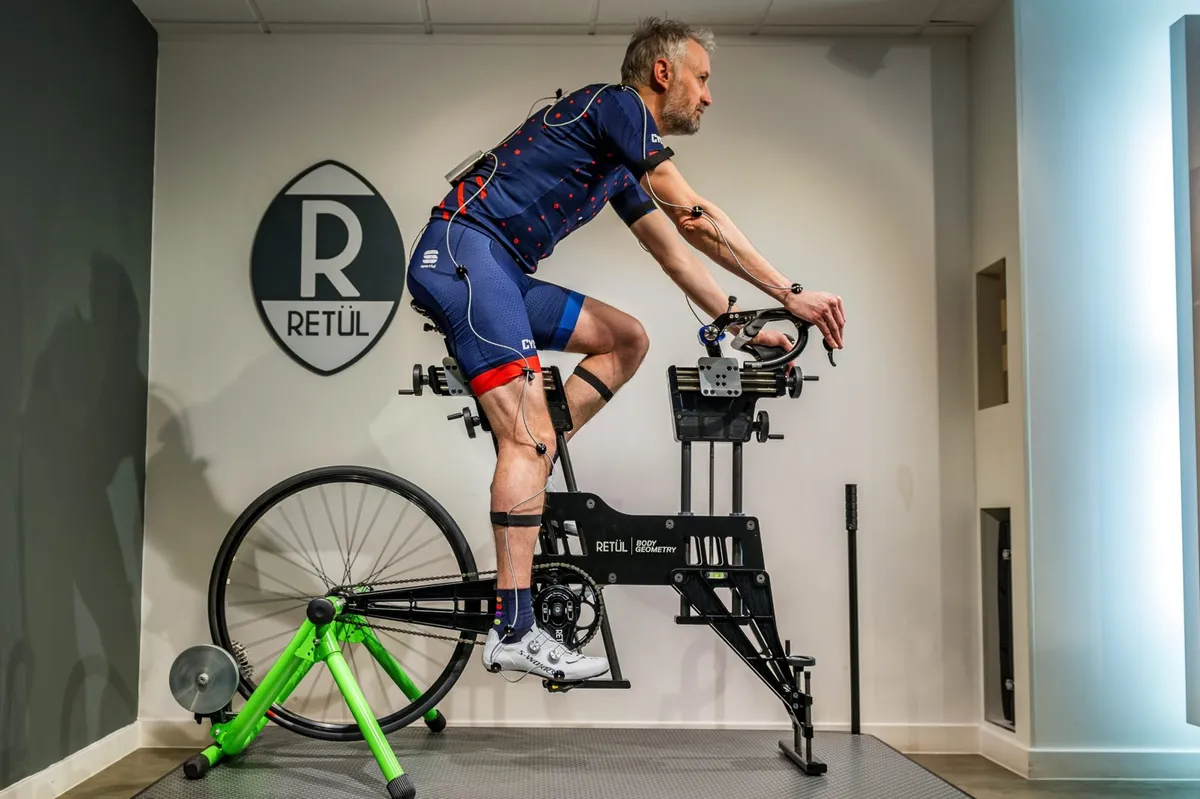
Bike fit is critical. A budget road bike that fits you like a glove will feel and handle much better than an ill-fitting superbike.
While most brands have bike fit charts on their websites, it’s vital to just go and sit on the thing if you are new to cycling.
Once you learn what fit works for you, you can shop using the charts; in the meantime, try bikes as you would shoes.
Once you have selected the right size frame – which any good bike shop can help you with – you then need to get your bike’s saddle height correct and adjust the handlebar height for comfortable riding. Again, a professional fit at a good shop is invaluable here.
Most good shops will work with you to fine-tune other elements of your fit too, such as the distance to the handlebar, the angle of the handlebar and even the feel of the saddle.
Just try a few until you find something comfortable – many saddle manufacturers will also offer demo services via their dealers.
Note that saddle preference is highly personal; there’s no universal right answer here. The best road bike saddles will be supportive while allowing sufficient blood flow in your delicate areas, and won't get in the way of pedalling.
Many saddles are considered unisex, but some of the best women’s road bike saddles have features specifically tailored to female anatomy.

